|
Scrapbook
Newspaper Clippings from the 1930s
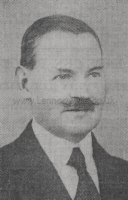
Death of Mr. S. Rea, The Mourne Pioneer, Twice Chairman of Board
1933
It is
with much regret we announce the death of Mr. Samuel Rea, J.P., 280
Ormeau Road, Belfast, which took place this morning in a local nursing
home following an operation. His illness was of recent duration, and
those who were in his company a week ago will be shocked and grieved to
learn that he is no more. The deceased, who was a native of the
Saintfield district and in his 74th year, occupied a leading place in
the commercial life of the capital, and was a prominent figure in public
affairs over a long period of years. In October 1879, he and his brother
in partnership opened a shop in Cumberland Street, Belfast, in the
grocery line under the style of T. & R. Rea. The premises were situate
in the very heart of what were known as the Brickfields, a district
lying between the Shankill and the Falls Roads. This district was but
partially built up at the time, and was the scene of many a riot. Mr.
Rea personally witnessed more than one conflict of the kind in the
vicinity of the shop. After about ten years trading the partnership was
dissolved, and Mr. Samuel Rea secured an excellent site in Duncairn
Gardens on the Macrory estate. He built fine, new premises, and as the
district grew rapidly the trade also grew and flourished. He also built
several lots of property on the Mountcollyer estate, and some years ago
opened a successful branch grocery establishment there. Later still, he
further extended his business by opening premises on the Antrim Road,
but in 1917 he gave up the retail business and became a partner with Mr.
H. Carrothers in the firm of Carrothers, Rea & Co., flour and general
merchants, Victoria Street. The deceased is survived by his wife, who is
a sister of Mr. W. I. Quinn, secretary of the Belfast Water Trust. Great
sympathy will go out to his family in their bereavement. His eldest son
is a doctor practising in London, whilst two of this four daughters are
in the teaching profession. Interred at Dundonald Cemetery. The chief
mourners were - Dr. S. B. Rea, London (son); Rev. George Walker,
Middlesbro', and Mr. Thomas G. Moore, London (son-in-law); Mr. W. I.
Quinn, O.B.E., secretary of the Belfast Water Board, and Mr. Robert
Ridges (brother-in-law); Mr. W. Percy Quinn (nephew).

4th May 1933 Belfast Water Commissioners photographed at the Commons Farm,
Woodburn
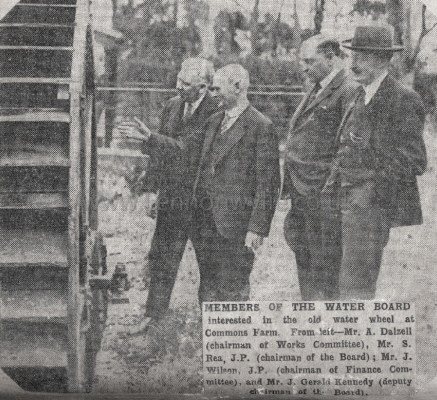
Members of the Water Board interested in the old water wheel at Commons
Farm. From left - Mr. A. Dalzell (chairman of Works Committee), Mr. S. Rea,
J.P. (chairman of the Board); Mr. J. Wilson, J.P. (chairman of Finance
Committee), and Mr. J. Gerald Kennedy (deputy chairman of the Board).
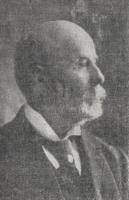
Veteran Master Printer Mr. Edward Johnston
Mr.
Edward Johnston, the well-known printer, stationer, and book-seller, so
long established at the premises, 3 Donegall Street, Belfast, has, we
regret to record, passes away, the sad event of his death in his 87th
year taking place early this morning at the residence of his son-in-law,
Mr. Alex. M. Adams, 2 Windsor Gardens. The late Mr. Johnston, who was a
native of Lisburn, and, until his demise, one of the oldest surviving
printers in Belfast, serving his apprenticeship with the famous Belfast
firm of Marcus Ward & Co. Later on he formed a partnership with the late
Mr. Allen, who was foreman printer for Messrs. Henderson, "Belfast
News-Letter," and set up in business on their own account at premises in
Arthur Street. Mr. Johnston celebrated his eightieth birthday, 4th April
1924. He is survived by his wife, his daughter, wife of Mr. Alex. M.
Adams; and his brother, Mr. James Johnston, with whom, as well as the
other relatives, sincere sympathy will be felt in their loss. Mr.
Johnston was 87 years old when he died, funeral from the home of his
son-in-law Mr. Alex. M. Adams, 2 Windsor Gardens, to the City Cemetery.
The chief mourners were - Mr. James Johnston (brother), Mr. A. M. Adams
(son-in-law), Messrs. Frederick Ernest, and Bertie Johnston (nephews),
Rev. S. Allen, Messrs. Joseph Allen (Lisburn), George Allen
(Hillsborough), John Smith (cousins.
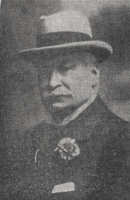
2nd August 1931 Mr. W. J. Marshall
A wide
circle of friends not only in Belfast but throughout various parts of
Ireland and across the Channel will be grieved to learn the unexpected
news of the death of Mr. William J. Marshall, J.P., the well-known
merchant tailor and outfitter, who for almost half-a-century conducted a
successful business at 39 High Street. Mr. Marshall, who, although
in his 74th year had the complexion, physique, and energy of a man many
years his junior, had gone on holiday to Harrogate a fortnight or so
ago, and in the hydro town had a recurrence of a cardiac ailment which
had attacked him when on a visit to the South of Ireland two years ago.
His son, Dr. Robert Marshall, of College Gardens, crossed to see him,
and the patient was able to return home in his company on Thursday
night. On Saturday night, however, there was a severe recurrence of the
malady, and in the early hours of Sunday Mr. Marshall breathed his last
at his residence, 2 Derryvolgie Avenue, Belfast. Mr. Marshall was a
native of Carricknahorna district of Ballyshannon, where the family had
been settled for over 200 years, and where his father, the late Mr.
William Marshall, was a much respected figure. Mr. Marshall was
predeceased five years ago by his wife, who was a daughter of the late
Mr. Samuel Shaw, of Belfast, and is survived by his son already
mentioned - one of the leading consultants in his profession and widely
known by his work at the Royal Victoria Hospital and the Ulster Hospital
for Women and Children, and by his daughter, Mrs. Martin K. Wallace,
B.A., LL.B., Belfast. The deceased gentleman, who was 73 years of age,
is survived by a son, Dr. Robert Marshall, and a daughter, Mrs. Eileen
B. Wallace, B.A., LL.B., of Belfast.
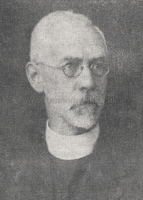
16th January 1931 Rev. J. C. Robertson, M.A., B.D., Belfast
We regret
to announce the death of Rev. J. C. Robertson, M.A., B.D., Principal of
Edgehill Theological College, Belfast, and a former President of the
Methodist Church in Ireland, which took place at a nursing home in the
city yesterday. Mr. Robertson had been taking an active part in the
"Youth and Religion" series of special services in progress at
University Road Methodist Church, but was obliged to leave Tuesday
evening's meeting owing to indisposition. The ailment proved to be more
serious than was at first thought, and it was deemed advisable to remove
him to a nursing home, where he underwent an operation on Thursday. The
deceased was the son of the late Rev. James Robertson, D.D., a greatly
beloved minister of the Irish Methodist Church, and was born in 1868. He
received his education at the Methodist College, Belfast; Wesley
College, Dublin, and Trinity College, Dublin, of which he was a
distinguished graduate both in arts and theology. Entering the teaching
profession, Mr. Robertson served on the staff of the Methodist College,
Belfast, for a period, but in 1895 he was accepted for the Irish
Methodist ministry. For two years he acted as assistant to the President
of the Methodist College, subsequently rendering valuable service on the
following circuits:- Wexford, Carlow, Portadown, and Kingstown. In 1907
the Conference called him to the responsible office of Tutor to the
theological students at the Methodist College. On the retirement of Rev.
J. W. R. Campbell, M.A., in 1920, Mr. Robertson succeeded to the
principalship of Edgehill Theological College, a post which he filled
until his death. His name will always be associated with the training of
the future ministers of the Irish Methodist Church, a work to which he
wholly dedicated his best energies. Mr. Robertson was united in marriage
with a member of a well-known Southern family, Miss Giles of
Enniscorthy. During his principalship of Edgehill Mrs. Robertson
assisted her husband in his work by graciously supervising the
house-keeping arrangements of the students' department. Sincere sympathy
will be felt with her in her sad loss.
Mr. Robert Arnold, Bangor
Mr. Robert Arnold, who died in his 76th year, at his
residence, "Knocktarma," Groomsport Road, Bangor, went to Belfast as a
young man from the neighbourhood of Portadown, and became well known in
commercial circles. About six years ago he retired from business and
went to reside in Bangor. On Thursday night, he became seriously ill and
passed away on Saturday morning. Mr. Arnold was a man of very genial and
kindly disposition and was a prominent member of the Methodist Church.
During his long residence in Belfast, he was attached to Ormeau Road
congregation and there held all the offices of the church open to a
layman. By his consistent life, he commanded the confidence of his
co-workers in the church and of the entire congregation. A fortnight ago
he attended the Ormeau Road church at the celebration of its diamond
jubilee, and was one of the speakers on that occasion. His wife, who was
a Miss Mercer, of Lurgan, predeceased him about two years ago. Their
sons, Mr. James Arnold, of Ravenhill Park, Belfast, and Mr. R. J.
Arnold, of Bangor, are in business in the city.
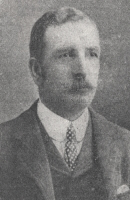
4th February 1933 Mr. Bass Capper
The
passing of Mr. Bass Capper, a well-known linen yarn manufacturer, who
died yesterday, aged 83 years, at his residence, "Lennoxvale," Malone,
Belfast, removes a prominent and respected figure from the industry with
which he was associated virtually all his life. Mr. Capper was the fifth
son of the late Mr. John Capper, who commenced business in the linen
yarn trade at Lurgan a long time ago, and it proved so successful that
it was transferred to Linenhall Street, Belfast, where there was wider
scope for its activities. That was sixty years ago, and when Mr. Capper
ultimately succeeded his father, the business continued to flourish
under his able direction. Of a kindly and generous nature, Mr. Capper
won the confidence of a host of friends by his integrity and he always
retained the respect of his employees and staff. He was recently laid
aside with serious illness, and passed away as stated. He was
predeceased by his wife, Miss Durant, of Manchester, who died in October
last, and he is survived by a son, who is in Southampton, and two
daughters, one of whom is the wife of Mr. Robert Glendinning, son of the
Right Hon. R. G. Glendinning, while the other is the wife of Mr. Kenneth
Moore. Another son, Mr. Bass Capper, jun., was one of the first despatch
riders to leave Belfast for the Great War, being subsequently
transferred to the Royal Flying Corps. While on a visit to England in
1917, he was the victim of a flying accident in England, and succumbed
to his injuries. The late Mr. Capper was one of the oldest members
of the Ulster Reform Club, where he was highly popular, and he was an
esteemed member of the Donegall Square Methodist Church congregation.
The remains of Mr. Bass Capper were removed this afternoon for interment
in the City Cemetery. Mr.
W. Knox
The death occurred at his residence, Delhi Parade,
Belfast, on Wednesday evening, of Mr. William Knox, who was a well-known
figure in Coleraine, where he was formerly the secretary of the North
Derry Unionist Association, secretary of the Coleraine Musical Festival,
secretary of the North Derry Agricultural Association, and secretary of
the Coleraine School Attendance Committee. Mr. Know, who was in his 75th
year, was a native of Liscurry, Strabane. Most of his life was spent in
Coleraine, where at one time he was in the drapery business, and later
was engaged as a commercial agent. He was a gifted elocutionist, and his
services were in great demand through-out the North-West. He was teacher
of elocution in McCrea-Magee College, Derry. He is survived by his wife.
Mr. W. T. Polley
Mr. William Thomas Polley, who was for over half a
century the esteemed travelling representative of Messrs. McCaw,
Stevenson & Orr, Ltd., and previously for Messrs. Marcus Ward & Co.,
Belfast, being formerly in business on his own behalf at Newry, passed
away on Sunday at his residence, 131 University Street, Belfast. The
news will be received with deep regret by his extensive circle of
friends, both in business and private life. Until he was laid aside
nearly three months ago by the illness which has terminated fatally, Mr.
Polley had been attending to his business duties, although he had never
recovered from the effects of shock sustained in a motoring accident
last summer. Born in London on June 15, 1848, Mr. Polley would, had he
survived, have celebrated his 83rd birthday on Monday next. In his early
days he came to Newry, where for a period he was in the employment of
Messrs. John Warnock & Co., printers and stationers, and later on he
embarked in the same line on his own behalf. About 62 years ago he
entered the service of the noted old firm of Marcus Ward & Co.,
discharging his duties as traveller with marked ability and energy.
Sincere sympathy will be extended to the bereaved wife and family.
Besides his widow he is survived by six sons and three daughters. All
the members of the family reside in Canada with the exception of the
eldest son, Mr. William Polley, who is a chief engineer in the Head Line
of steamers, and the latter's son, William, grandson of deceased, also
an officer in the Head Line. Both of these are at home from sea at
present and will thus be enabled to attend the funeral. One of the
daughters of Mr. and Mrs. Polley has been in Belfast for several weeks
from Toronto and gave devoted nursing assistance during her father's
trying illness.
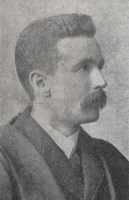
14th March 1932 Mr. A. L. Donald, B.A.
With deep
regret we announce the death of Mr. Albert L. Donald, B.A., which took
place in the early hours of Sunday, at his residence, 57 Camden Street,
Belfast, an unexpected event which will be sincerely mourned in
educational and literary circles in the city and Province. Mr. Donald
had suffered a breakdown in health some six weeks ago. He was making
what appeared to be a steady recovery, but passed away in his sleep on
Sunday morning. The youngest son of the late Rev. James Donald,
Methodist minister, Mr. Donald was educated at the Methodist College,
Belfast, where he was a pupil of great brilliance, carrying off prizes
in English literature and classics, his favourite subjects, and the
silver medal for classics in the scholarship class. The special prize
for excellence in classics in the Middle Grade Intermediate examinations
in his year also fell to him. Passing to the old Queen's College,
Belfast, in the session of 1886-87, further honours fell easy prey to a
student of his brilliance, and in his first year he won the Third
Literary Scholarship, and in the following year he held the Fourth
Literary Scholarship. He took the degree of Bachelor of Arts in the
Royal University with second class honours in Ancient Classics and an
exhibition. For a period Mr. Donald taught in his old school, "Methody,"
where his brother, Mr. R. J. F. Donald, M.A., was senior classical
master for many years, and there was no one with a mind better stores in
all that is best in English and the classics, the subjects in which he
imparted tuition. Later he successfully conducted tutorial classes, and
many who achieved high honours in university examinations to-day hold
positions in the academic world, and in other spheres are the first to
confess how much they owe to their coach. Mr. Donald contributed freely
to several journals, and won a niche in journalism all his own as "Aquilo"
in "Ireland's Saturday Night," where his "Wandering Thoughts" gave
pleasure and profit to thousands of readers every week. A man of simple
tastes, who lived his quiet life, never happier than amongst his books,
he was beloved of his intimates. He remained a bachelor, and resided
with his brother, Mr. R. J. F. Donald, to whom in a loss so acute the
keenest sympathy will go out. The funeral will take place on Tuesday
afternoon to Knockbreda.
Mr. D. W. Watson
The death occurred yesterday of Mr. David W. Watson, a
well-known manufacturers' agent in Belfast. Mr. Watson, who carried on
business in Castle Lane with his step-brother, as Messrs. D. & W. G.
Watson, was a highly respected member of the business community.
Educated privately under the tuition of the Rev. David Fleming, of
Rathfriland, he gained his first business experience in Newry,
subsequently entering the firm of Messrs. Robinson & Cleaver, and later
that of Lowry & Co., Belfast. Over 30 years ago he commenced business on
his own account, and in this he was actively engaged until three months
ago when he became ill. The funeral will take place on Monday from the
residence of his son-in-law, Dr. S. R. Foster, of University Square. Mr.
Watson took a keen interest in Fisherwick Presbyterian Church, where he
had been a member of session for some years. He had also acted as
superintendent of the afternoon Sabbath school. He was a Free Mason
being a P.M. of Claremont Lodge No. 423. Mr. Watson was a golfer, and
was a member of the Malone Club. He is survived by his daughter, Mrs.
Foster, to whom sympathy will be extended in her bereavement.
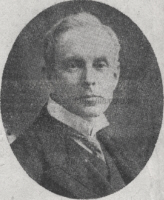
22nd April 1933 Mr. William R. Rea
We regret
to announce the death of Mr. William R. Rea, at his residence, 8 College
Green, Belfast. The interment took place, yesterday, at the family vault
in the City Cemetery. Mr. Rea was chairman of the Lagan Navigation
Company, and also of the Inland Navigation Company, Ltd., but had not
enjoyed good health for some years, and latterly did not take an active
part in business affairs. He was formerly a member of the Belfast
Chamber of Commerce, the Belfast Harbour Commissioners, the local Marine
Board, and the Shipping Federation. He was born at Stanley House,
Holywood, and for some time resided at "Abbeylands," Whiteabbey. He was
a son of the late Mr. Hugh Rea, a well-known West Indian trader, who was
also associated with the Northern Bank, and was concerned in shipping
interests. Mr. William Rea was a relative of the late Mr. James
Alexander Henderson, J.P., managing-proprietor of the "Belfast
News-Letter" from 1845 to 1883, and Mayor of Belfast 1873-1874. He is
survived by his wife, a son, and three daughters. The son, Mr. Cecil A.
Rea, served with the Royal Air Force during the Great War, and is now
engaged in civil aviation. One daughter is married to Mr. R. L. Kemp,
managing-director of James Little & Co., Belfast, and another daughter
married Mr. Carlton Reid, a director of J. Harrison Crossfield & Co.
Ltd., while the third is married to Mr. James H. Haslett, eldest son of
the late Sir James Haslett, M.P. Mr. Henry Tighe Rea, a brother of the
deceased, is Northern Ireland Consul for the Netherlands, and secretary
of the navigation companies of which his brother was chairman. The late
Mr. Rea was well known in Belfast, and the greatest sympathy will be
extended to his relatives in their bereavement.
26th March 1933 - Mr. John T. Morton
The funeral took place to the City Cemetery
to-day of Mr. John T. Morton, Ravenhill Road, Belfast, whose death is
deeply regretted not only by his many personal friends but his
colleagues in the teaching profession and by members of the Methodist
Church. There was a very large attendance of members of the two latter
bodies at the funeral. Messrs. Thomas Johnson & Son, Bedford Street,
Belfast, had charge of the funeral arrangements.
22nd August 1930 Mr. Hans Iten (died 21st
August)
Lovers of art in Belfast and, in fact, in
all the principal cities in England and the Continent will regret the
death of Mr. Hans Iten, of 18 South Parade, Belfast, which occurred at
Bulach, Switzerland, during the weekend. Some time ago Mr. Iten had a
breakdown in health. It was thought that a change to his native country
would be beneficial, and when he left Belfast he carried with him hearty
good wishes for a speedy recovery. Such was not to be, however,
for complications ensued which proved fatal, and the greatest sympathy
will be extended to Mrs. Frieda Iten, who is also of Swiss extraction,
in her entirely unexpected bereavement. Mr. Iten received his education
at St. Gall, Switzerland, and afterwards studied in Paris. As an artist
his best work was accomplished in still life, and his floral pictures
were the delight of all who love flowers. One such subject, a bowl of
dahlias and mid-summer daisies, is at present in Messrs. Rodman's Art
Gallery, Donegall Place, Belfast, and is a good example of the reality
which his brush could impart. For many years he has resided in Belfast,
and each year the circle of his friends grew wider. They accorded him
their hearty congratulations when in 1927 he had a picture accepted at
the Royal Academy, and since then he has been an almost regular
exhibitor there. He has also exhibited in the Official Salon, the
Society of French. In his will .. he left three-fourths of the residue
of the property to his wife and one-fourth to his father, or, in the
event of his predecease, as to one-third each to his brother Oskar and
his sister Marie and one-third each to the children of his brother
Edward. He stated: "It is my wish that my wife should not marry again."
23rd March 1933 Mr. J. T. Morton, Belfast
The death took place at his residence, 394
Ravenhill Road, Belfast, on Thursday night, of Mr. John T. Morton, a
well-known school teacher in the city. A considerable portion of Mr.
Morton's career was spent in Belfast, where he held a number of
important appointments. A member of the Methodist Church, he attended
Donegal Square Church. Deep sympathy will be extended to the widow and
family. The funeral takes place to the City Cemetery this afternoon.
Mr. William Hughes, J.P.
Much regret will be occasioned by the death
of Mr. William Hughes, J.P., 14 Stranmillis Road, Belfast, which took
place at a private nursing home on Monday. Deceased, who was 65 years of
age, was a popular figure in the business life of the city, and had
surrounded himself with a wide circle of friends, by whom he was greatly
esteemed for those qualities of character which marked the true Catholic
gentleman. The late Mr. Hughes commenced his business career at the age
of 16, when he joined the clerical staff of Messrs. Peter Keegan and
Co., Ltd., wholesale spirit merchants, Callender Street, Belfast.
Showing early that business acumen which so distinguished him in later
years, his promotion was rapid, until eventually he was made managing
director of the firm, a position which he occupied with great success
for many years. He will be deeply missed by his many friends, who
recognised his sterling worth and kindly nature. The funeral, which will
be private, will take place to-morrow to the family burying ground at
Banbridge. R.I.P.
February 1933 Mr. S. R. Bolton
General regret will be created not alone in
business but in literary, dramatic and artistic circles, by the
announcement of the death of Mr. S. R. Bolton, of Belfast and Whitehead,
which took place on Wednesday in the Royal Victoria Hospital from
pneumonia. The late Mr. Bolton was removed from Whitehead to hospital on
the orders of his medical adviser Dr. Wm. Martin, J.P., but the most
skilled attention of doctors and nurses could not avert the end. Several
years ago Mr. Bolton spent a period in South Africa, where he found the
climate beneficial to his health. The late gentleman, who was a member
of the Ulster Arts Club, was one of the most gifted textile designers in
the North of Ireland. He specialised in handkerchief embroidery designs.
He was formerly on the staff of Messrs. Henry Matier & Co., Ltd., but in
recent years was in business on his own account, with offices in Queen
Street. Mr. Bolton's leisure time was largely devoted to literary and
dramatic production. He was a leading figure in the school of amateur
players in Ulster, whose work in recent years has been altogether
praiseworthy. Not only was he a prominent member of the Carrickfergus
Players, but he was the author of dramas and comedies which have had
quite popular stage runs. His works include "Going West" "The Witness to
the Will" "Miss Clegg's Legacy" and "The Sentimental Quartet." Mr.
Bolton, who was unmarried, was the younger son of Mr. S. R. Bolton,
resides in London, and his only sister is a resident of the U.S.A. His
brother Thomas arrived in Belfast this morning, and in his melancholy
mission he has the sympathy of a wide circle of friends. Both Mr.
Bolton's parents are dead.
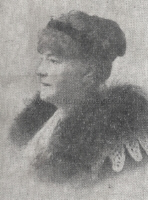
22nd November 1934 Mrs. Crofts-Mollan
We regret to announce the death of Mrs. Phoebe
Mary Crofts-Mollan, which took place at Kilmood Vicarage, Killinchy, Co.
Down, today. She was the daughter of Mr. Wills George Crofts, of Temple
Mary, Co. Cork, and widow of Mr. William Mollan, Dublin. A woman of wide
and varied talent, she was a profound student of history and had
travelled a good deal in many lands. She was well informed upon a
variety of subjects and wrote upon them with great skill and
understanding, being a frequent contributor to the columns of this
paper. In later years she fulfilled all the high hopes that were
entertained for her by her friends as a writer of graceful and cultured
English and she contributed to papers and magazines not only in this
country but in France, America and Canada as well. Articles of travel,
history, educational and social subjects came from her ready pen and she
also wrote extensively of her native land and of old Irish industries
and customs. To her sister, Mrs. Wilson, The Vicarage, Killinchy, and
other relatives, we extend our sincere sympathy. The chief mourners were
Mrs. H. Wilson, wife of the Rev. H. Wilson, the late rector of the
parish, and Dr. H. Wilson (brother-in-law).
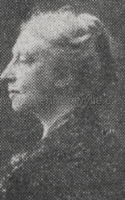
Lady Augusta Gregory
The famous Irish
dramatist and founder and inspirer of the Irish National Theatre, died
yesterday, age 76, at Coole (Coale) Park, Gort, Galway. Irish
nationality has through her death lost a leader and a friend. It was to
her house in London that Mr. W. B. Yeats came with his idea of a "Little
theatre somewhere in the suburbs" where verse plays could be given
before select audiences, but Lady Gregory persuaded Mr. Yeats to
establish the theatre in Dublin rather than in London. Many famous
people met at her London home. Later Miss Horniman, of the old Gaiety
Theatre, Manchester, came to her aid in establishing the Irish National
Theatre in the Abbey Theatre, Dublin, of which Lady Gregory was a
director, and where nearly all of her 30 plays have been staged. Her
plays have been translated into almost every European language, as well
as into Japanese. Lady Gregory was born at Roxborough, County Galway, in
1856. In 1880 she married, as his second wife, Sir William Gregory,
M.C., M.G. at one time Governor of Ceylon, who shared her love of
Ireland and of art. He died in 1892. The Abbey Theatre was really
founded at Lady Gregory's delightful place, Coole Park, where she
entertained from time to time almost every personality of note in the
literary world. Lady Gregory was foremost in the fight to have the
famous collection of pictures left by her nephew, Sir Hugh Lane,
returned to Dublin, where, according to Irish claims, he intended them
to rest. They at present hang in the Tate Gallery, London, but efforts
to have them returned to Dublin, where a gallery for them is being
provided, are not being relaxed. The youngest daughter of the late Mr.
Dudley Persse, D.L., of Roxborough, County Galway, she married in 1881.
She also published an autobiography of her husband in 1894. She was born
1856. The remains of Lady Gregory were removed from her residence and
interred in the Protestant plot in the New Cemetery, Galway, beside one
of her sisters, Mrs. Waithman. Chief mourners included Captain G. Gough
and Mrs. Gough, Viscount Gough and Mr. W. B. Yeats, Mr. Lennox Robinson,
Mr. Arthur Shields, Mr. Denis O'Dea, and Mr. F. J. McCormack. Mr. P. J.
Little, T.D., represented Mr. De Valera, and there was a large
attendance of the general public.
Mr. R. G. Laughlin (Robert Gardiner) (died 11th
May 1931)
The death occurred at his residence at
Somerset Terrace, 129 University Street, Belfast, to-day of one of the
oldest and best known merchants of the city, Mr. R. G. Laughlin. He was
formerly manager of Messrs. Currie's, High Street, and took over the
wholesale end of that firm's business, but his premises in Skipper
Street were perhaps better known to the public. At the morning service
in Carlisle Memorial Hall, the Rev. A. Cairns paid a warm tribute to the
memory of Mr. R. G. Laughlin, who had been a member of Donegall Street
Congregational Church for over fifty years. He said that Mr. Laughlin,
from the time he entered upon his business career at the age of 15 until
within a few weeks of his death at the age of 82, had filled the years
with unceasing and fruitful labour. It was to be regretted that in his
closing days he had the pain of seeing the Church he loved destroyed by
fire. Deceased's eldest son is in business in London, and his other sons
were associated with him in the Skipper Street premises. He was interred
at Belfast City Cemetery. (He died on a Monday)
Mr. E. I. Officer, Nyasaland
As the result of a motor accident, Mr. E.
I. Officer, a Belfastman, who resided at Blantyre, Myasaland, has met
his death. He was the son of Mr. and Mrs. E. Officer, 22 College Park
Avenue, Belfast, and before emigrating to Central Africa, where he
became employed as manager of the Consolidated Plantation Supplies
Company's general hardware and motor accessory stores, he served his
apprenticeship with Messrs. Riddel, Ltd., Donegall Place. The late Mr.
Officer was 28 years of age, and a former member of Victoria Swimming
Club and the 52nd Company Boys' Brigade. He was also connected with the
Crescent Presbyterian Church
2nd March 1934 Mr. Harry R. Douglas
A representative attendance of people
interested in art, as well as the general public, attended the funeral
of Mr. Harry R. Douglas, the well-known Belfast artist, whose remains
were removed yesterday from the residence of his son, Mr. Ronald
Douglas, 43 Brookvale Street, Cliftonville, for interment in the City
Cemetery. Born in Edinburgh in 1862, Mr. Douglas studied art under the
late Sir Noel Peton, and in 1891 he came to Belfast and commenced
business as a portrait painter. His largest portrait was that of Sir
Robert Meyer, which hangs in the City Hall. The late Mr. Douglas was a
former nice-president of the Ulster Art Society and exhibited works at
the Royal Scottish Academy, Royal Hibernian Academy, and the Royal
Cambrian Academy. He wrote the first guide book to Ulster published by
the L.M.S. Railway Co., and he was also the author of the first angling
guide to Ulster, published by the Ulster Tourist Development
Association. He was a member of the North-East Ulster Angling Club, the
Ulster Anglers' Association, and the Federation of Ulster Angling Clubs.
Mr. Douglas belonged to the Masonic Order and was Past Master of Lodge
No. 783, whilst he was also an honorary member of Lodge No. 440.
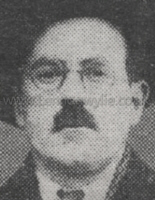
Mr. Patrick Tuohy
Irish Artist's Tragic Death
A Reuter New York message
says Mr. Patrick Tuohy (36), a member of the Irish Royal Academy and the
son of a Dublin physician, has been found dead, asphyxiated by gas at
the top of an apartment house in Riverside Drive. He had been dead for
about a week, according to the report of a doctor who was summoned as
soon as the discovery was made.
14th April 1932 Mr. Andrew M. Stone
The death of Mr. Andrew M. Stone, which
took place suddenly yesterday at his residence, 86 Holywood Road,
Belfast, has caused deep regret to his many friends. For many years Mr.
Stone was a familiar figure at the Belfast Hippodrome where he held an
important staff position. His genial disposition, and his readiness to
assist in the promotion of charitable entertainments and concerts won
for him the esteem of all with whom he came in contact. He took a deep
interest in the Not Forgotten Association and rendered valuable
assistance to that body in organising outings and entertainments for
ex-Service men still in hospital. He was also prominent in sporting
circles and was an ardent supporter of association football. Shortly
after his retirement from the Hipprodrome, (Hippodrome) staff, Mr. Stone
took over control of the Picture House at Holywood. He was interred at
Movilla Cemetery. He passed away on Thursday after a sudden illness.
Rev. Archibald Blue (U.S.A.), acting minister of May Street Presbyterian
Church, and Rev. John Armstrong, Kilbride, officiated at the home and
graveside. Chief mourners were: Mrs. Croll and Miss A. Stone (sisters);
Messrs. James A. Stone (brother), F. J. Brown and Andrew Croll
(brothers-in-law); Gordon Stone (nephew); H. Tanner, S. Gordon, S.
Gordon, jun., A. M. Gordon, W. Gordon, and J. Cherry (cousins); Bertie
Hamilton, Bertie Cunningham, W. Ferguson, B. Ferguson, and J. Magee. Mr.
George Dobler, manager of the Belfast Hippodrome was also present, and
the owners and staff of Holywood Picture House were represented.
Mr. George Maxwell
Subscribers and visitors to the Belfast Linen Hall Library will learn
with deep regret of the death of Mr. George Maxwell, the esteemed and
ever-courteous sub-librarian. Mr. Maxwell had been in ill-health for
several weeks, and lately suffered a relapse, from which little hope was
entertained for his recovery, and he passed away on Thursday, at his
residence, 671 Lisburn Road. The funeral took place this afternoon to
the City Cemetery. Mr.
James Carson
. . of Aberfoyle, Maryville Park, Belfast,
late of Mullan's, Donegall Place, who died on 17th November 1927, left
£250 to the Presbyterian Orphan Society. The following bequests are also
made in his will: To the Zenana Mission, £150; to the Royal Victoria
Hospital, Belfast, £526 6s 3d five per cent. War Loan stock; to the
Children's Hospital, Queen Street, Belfast, £500 five per cent. War Loan
stock; to the Foreign Mission in connection with the Presbyterian
Church, £400 five per cent. War Loan; and to the Qua Iboe Mission in
connection with the Presbyterian Church in Ireland, £400 five per cent,
War Loan Stock. After making certain pecuniary and specific bequests,
the testator bequeathed the entire residue of his estate to the Royal
Victoria Hospital, Belfast, the Presbyterian Orphan Society, and the
Children's Hospital, Queen Street, Belfast, in equal shares.
Mr. J. O. G. Duffy
Mr. James O. G. Duffy, novelist,
playwright, and newspaper editor, a native of Strabane, and a writer for
the "Philadelphia Evening Bulletin," has died at his home in the United
States. Born in Strabane on 4th January, 1864, the son of Thomas P. G.
and Susan Toorish Duffy, he was educated privately, and travelled
extensively in his youth. In 1897 he received the LL.B. degree from the
University of Pennsylvania. For many years he was associated with the
"Philadelphia Press," which no longer exists. He was Sunday editor from
1891 to 1896, dramatic editor and critic from 1893 to 1911, literary
editor and principal reviewer from 1896 to 1911, associate editor from
1911 to 1913, dramatic editor and associate editor from 1914 to 1920.
Mr. Duffy was admitted to the United States Bar in 1897, and was general
counsel for an allied group of corporations for a number of years. Among
his works are "Glass and Gold" (a novel); "Hohenzollern" (a play), which
he wrote with Cyrus Townsend Brady; "The Golden Fleece" and "Brenda's
Elopement" (two plays); and "The Sting of Death" (a novel), which was
published in 1916. He was also the complier of "Tales from Bohemia,"
published in 1908.
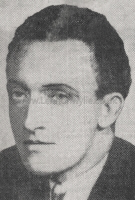
1932 - Mr. Dennis Neilson Terry
Bulawayo
(Rhodesia), Thursday, Mr. Dennis Neilson Terry, the well known English
actor, died here at mid-day to-day. Mr. Terry, who had been suffering
for some days from double pneumonia, was the son of Fred Terry and Julia
Neilson. He was 37 years of age. He made his first stage appearance when
he was only 11. He then "walked on" as a page in "Much Ado About
Nothing," At the performance to commemorate Ellen Terry's jubilee five
years later he commenced his regular stage career under the name of
Derrick Dennis at the New Theatre in "As You Like It." He appeared in
May, 1924, at the Belfast Opera House with his wife. Up till the
outbreak of the Great War, when he enlisted in the Royal West Surrey
Regiment, he appeared in many Shakespearean productions both in London
and the Provinces. Many people connected with the stage attended the
funeral service yesterday of Mr. Dennis Neilson-Terry, the actor, which
was held at St. Paul's Church, Covent Garden, London. Mr. Neilson-Terry
died in South Africa while on tour, and his body was brought home in the
liner Warwick Castle. In accordance with his wish mourning was not worn
at the funeral. There were many wreaths, the chancel being almost filled
with flowers. The principal mourners were Mrs. Neilson-Terry, the widow,
and her two young daughters; Mr. and Mrs. Fred Terry (parents), and Miss
Phyllis Terry (sister). 18th
April 1933 Mr. Fred Terry
. . the veteran actor-manager, and brother
of the late Dame Ellen Terry, died at his home at Hampstead last night,
aged 69. He had been in poor health for many months, and the death of
his son, Dennis Neilson-Terry, in Africa last year was a very heavy blow
to him. He rose from a sick bed to attend the funeral. A doctor had been
in attendance for many weeks. Yesterday Mr. Terry became worse, and he
died peacefully in the presence of his wife, formerly Miss Julia
Neilson, his partner in many stage romances, at 9 o'clock. A member of a
famous family of actors, Fred Terry was born on 9th November, 1863.
There were four sisters and three brothers, all of them great players in
their day, who included Ellen and Kate Terry and George and Charles
Terry. Fred Terry was the last survivor of them, and he had been one of
a family of 14. He married Julia Neilson, thus linking up two acting
families. It was in January, 1880, fifty-three years ago, that he made
his first appearance on the stage. He played under the Bancrofts at the
Haymarket in a walking-on part in a revival of "Money."
19th April 1933 Royal Sympathy For Mrs. Terry - A Telegram from the
King and Queen.
The remains of Mr. Fred Terry, the famous
actor-manager, whose death at his home at Primrose Hill, London, N.W.,
on Monday night was announced in the late editions of The Daily Mail
yesterday, are to be cremated at Golders Green, N.W., to-morrow at 9.30
a.m. A memorial service will be held in the early afternoon at St.
Paul's Church, Covent Garden. A telegram of condolence was sent
yesterday on behalf of the King and Queen, to Mrs. Terry (Miss Julia
Neilson), while a continued stream of message and telegrams bore
testimony to the grief of the theatrical world at the passing of the
last of the elder generations of Terrys. While Miss Julia Neilson's
plans for the future are not settled, her friends do not anticipate that
she will return to the stage. She has not acted since her husband's
illness compelled him to break up his touring company a year or so ago.
Miss Phyllis Neilson-Terry, her daughter, is appearing at Nottingham
this week in "Evensong." She paid a hurried visit to London yesterday to
be with her mother, and will come down again to-morrow for the memorial
service. Three coach loads f magnificent flowers from his many friends
in the theatrical profession came to Golders Green Crematorium to-day,
when the funeral took place of Mr. Fred Terry. Sir Johnston Forbes
Robertson, another veteran actor, was one of those who sent wreaths. In
view of the memorial service later, the attendance at the funeral was
largely confined to the family and personal friends. A short service was
conducted by the Rev. R. Hart Davies, of St. Paul's, Covent Garden. Sir
- The Obituary notices of Fred Terry omit to mention the glory of his
voice. The art of declamatory acting is dying out, and it is a matter
for universal regret when a famous figure departs who has held all
hearts by his voice. Theatregoer, Grimsby
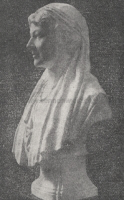
20th June 1935 Viscountess Pirrie (78)
Margaret Montgomery Pirrie (1857-1935)
We regret
to announce the death, which occurred at her residence, Carlos Place,
London, early yesterday morning, widow of Viscount Pirrie, a former head
of the great Belfast shipbuilding firm of Harland & Wolff. Lady Pirrie,
whose passing is so sincerely mourned in Belfast, contributed largely to
her husband's success in life. It may be recalled that in reply to an
address from the Queen's Island workers on the occasion of his elevation
to a Viscountcy, Lord Pirrie said:- "My wife was my inspiration when I
was young, and, after more than forty years of married life, continues
to be so, and has been in every sense of the term a real helpmeet. She
has never spared herself, and has supported me in the various
undertakings which have been essential in the expansion of Harland &
Wolff's works." Her father was John Carlisle, M.A., an outstanding
figure in the annals of the Royal Belfast Academical Institution, and
her mother was Catherine, daughter of Alexander Montgomery, of
Dundesart, County Antrim. One of Lady Pirrie's brothers, the late Right
Hon. Alexander Carlisle, of the Queen's Island, was born at Ballymena,
while his father held the position of inspector of national schools in
that district. Funeral will be to the Belfast City Cemetery on Saturday
forenoon. Marble bust of Viscountess Pirrie, by Mr. A. Bertram Pegram,
the noted sculptor, presented to the Royal Victoria Hospital, Belfast,
by the members of the Carlisle family.
July 1935 Mr. Donald McPherson
. . a well known Belfast artist, passed
away at his residence, Earlswood Road, yesterday. He was a foundation
member of the old Belfast Ramblers' Sketching Club, out of which was
formed the Belfast Arts Society, which in recent years became the Ulster
Academy of Arts. He was also a member of the Ulster Arts Club, and a
frequent exhibitor at exhibitions in Belfast and further afield. As a
landscape painter, Mr. McPherson enjoyed a high reputation, and his work
was characterised by a peculiar delicacy and charm. He was particularly
successful in the water colour medium and revelled in the Ulster scene,
from which he drew much of his inspiration and material. He was highly
esteemed by the members of his profession, and his death is deeply
regretted by all who knew him. Mr. McPherson was born in Belfast of
Scottish parents, and served his apprenticeship with Messrs. Little &
McClean, Ltd. The funeral of Mr. Donald McPherson, took place this
afternoon from his late residence, Kintore, Earlswood Road, Strandtown,
the interment being in the City Cemetery.
Mr. Standish O'Grady
We are informed (says the "Times") that Mr.
Standish O'Grady, the Irish man of letters, died last Friday at Shanklin,
Isle of Wight, at the age of 81. He left his house, Rosmaree, for a
walk, was taken ill suddenly, and was brought home dead. He had left
Ireland many years ago, long before the late troubles. Standish O'Grady
was born in September, 18, 1846, at Castletownberehaven, County Cork, of
which his father, Rev. Thomas O'Grady, was the Protestant rector. From
Tipperary Grammar School he entered Trinity College, Dublin, where he
won a classical scholarship and silver and gold medals. He was also an
adept at cricket, football, hockey, and rowing, and carried off several
prizes at the college sports. A man of versatile character his
activities included politics (once he was an active Conservative and
then an extremist in the Irish Labour movement), Journalism, Celtic
literature, Irish history and fiction. Called to the Irish Bar in 1872
he went on Circuit for a time, but gave up the law for journalism,
becoming a leader writer on the staff of "Saunder's Newsletter" at a
time when Mr. T. P. O'Connor, M.P., was a reporter on the same paper.
Later he went to the "Dublin Daily Express." A quarter of a century ago
Mr. O'Grady severed his connection with the Dublin Press and went to
England, becoming a regular contributor to the "Gentleman's Magazine"
under the pen name of "Arthur Clive." He afterwards devoted himself
largely to the study of Irish history, and was the author of a number of
works of research, including one on Cuchullain the legendary Ulster
hero. A good many years ago he visited Belfast and wrote some
interesting articles for the Press on his impressions of life in the
city. He is, perhaps, best known to the public by his works of fiction
like the "Boy of Stars" and "Ulrick the Ready," which depict life in
Ireland at various periods in an attractive manner.
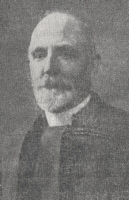
Dr. Grierson
We regret
to announce the death of the Rt. Rev. Dr. Charles Thornton Primrose
Grierson, who for almost eighteen years was Lord Bishop of Down and
Connor and Dromore, which occurred yesterday at his residence, 66
Somerton Road, Belfast. A great Christian gentleman has passed away, one
who enjoyed in a remarkable degree the confidence and affection of all
classes of the Protestant community throughout the length and breadth of
the land, and whose life-work on behalf of the Church of Ireland will
form perhaps the most enduring monument to his memory. Ordained in May,
1881, his ecclesiastical jubilee took place in 1931. The announcement
that he had decided to lay aside the active duties of office was made in
September 1934, the retirement being made imperative by medical advice,
as Dr. Grierson was then 77 years of age, and the intimation of his
resolve sent a wave of regret throughout the Church of Ireland as well
as other Christian denominations all over the country.
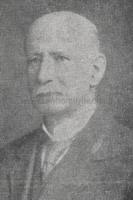
Mr. James Guiler
His many friends will learn with
great regret of the death of Mr. James Guiler, M.P.S.N.I., the
well-known pharmacist, which took place on Saturday at his residence, 89
Ormeau Road, Belfast. He had been in failing health for several months
past and on that account had been obliged to retire in October last from
the successful business he had for many years carried on in the Ormeau
Road district. The late Mr. Guiler was a man of wide experience in
connection with the chemists' profession, and his high reputation was
far from being confined to Belfast, but extended to trade circles all
over the country. He qualified as chemist in 1884, and the early period
of his career was spent in Armagh. Subsequently he was representative
for a period, of a leading English firm in the drug business; after
which he started on his own account in Ormeau Road, where he carried on
a high-class trade successfully for many years, until his recent
regretted retirement. Possessed of marked abilities as an organiser, and
enjoying the confidence of all associated with the business, Mr. Guiler
was one of the founders of the Ulster Retail Drug Trade Association,
which had the benefit for many years of his services as hon. secretary.
He was an officer of the North Irish Pharmacists' Association, and in
addition had been chairman of the executive committee of pharmacists,
which engaged in the consultations with the Government leading up to the
passing of the Pharmacy and Poisons Act of 1925. Under this measure, a
separate association was set up for the pharmacists of the Six Counties,
and, the first appointments being by nomination, Mr. Guiler, as a mark
of the appreciation of the Home Minister for the valued services he
rendered, was invited to become the first President. He, however, to the
regret of his friends, felt obliged to decline the honour on health
grounds. For many years Mr. Guiler acted as examiner, in Dublin, for the
Pharmaceutical Society of Ireland in botany, pharmacy, and materia
medica. He also served as examiner when the new body was set up in
Northern Ireland. The late Mr. Guiler was of a most genial, courteous
disposition. He had cultured tastes, and was much devoted to literary
and scientific studies. A Presbyterian, he had for many years been
actively identified with the Cooke Centenary Church, holding the office
of elder. Prominent in Masonry, he was P.M. of Rosetta Lodge 188; P.K.
of R.A.C. 188; member of R.A.C. 279, and of Preceptory No. 106. Sincere
sympathy will be extended to the widow and family of four sons. The
chief mourners were:- Messrs. J. Rowland Guiler and William C. Guiler
(sons), Robert K. Guiler (brother), and David Howard (brother-in-law.)
Mr. S. McNeilly
A memorial service for the late Mr. S.
McNeilly was held in Broadway Presbyterian Church, Belfast, on Sunday
evening at seven o'clock, and was conducted by Rev. J. W. Gibson, M.A.
After an appropriate sermon, based on Philip i., 21, Mr. Gibson went on
to say that it devolved upon him to say a few words with reference to
the one for whom that memorial service was being held. He felt, he said,
how inadequate must any words of his be to express their sense of loss
they had sustained through the passing away of their highly esteemed
member, Mr. McNeilly. What he was to most of them they all knew and how
difficult it would be to fill the place he had left vacant. In that
congregation he was a tower of strength, ever ready to spend and be
spent in his Master's service, and to help in the work which was so dear
to his heart. For years he had been one of their most faithful elders,
and for an almost similar period their respected clerk of session. He
was always willing to help his minister in every way he could, and the
Church could ill afford to lose one such as he was. And what he was
inside the Church, that he was outside it. He was prominently identified
with the Masonic and Orange Institutions and filled some of the more
important offices in them, where in the discharge of his duties he won
the approval of all concerned. To all the sorrowing ones at home they
tendered their heartfelt sympathy and they prayed that the God of all
Consolation might abound to them and enable them to say the will of the
Lord be done. Mr. James
Blyth
. . "the novelist of the Norfolk Marshes,"
died in Paddington Hospital yesterday after a painful illness. Mr Blyth
was 69, and he had written more than fifty published works. His last
novel, "The Riddle of the Marsh," was published in 1922.
Mr. Thomas Green
The death took place at his son's residence, Limehurst,
Holland Park, Belfast, yesterday, of Mr. Thomas Green, a member of the
board of directors of Messrs. Grattan & Co., chemists, Corn Market.
A native of Lancashire, Mr. Green, who was 87 years of age, came to
Belfast 65 years ago as manager of Messrs. Grattan's dispensing
department, and was a member of both the English and Irish
Pharmaceutical Societies. He retired from active service on the board
about 1920. Mr. Green was also a trustee of Donegall Square Methodist
Church, in which he took a deep practical interest. His son is Mr. H.
Percy Green, of Holland Park.
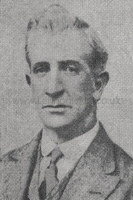
Mr. Hugh Hobson
The death occurred yesterday, at his
residence, Rosario, Ormeau Road, Belfast, of Mr. Hugh Hobson, J.P., head
of the firm of Messrs. Hugh T. Hobson & Son, manufacturers, College
Street, and a director of the Clarence Clothing Company, Ltd., Belfast.
Mr. Hobson was a former chairman of St. Jude's polling district of the
Ormeau Unionist Association, and before the Great War was actively
identified with the U.V.F. movement. On the outbreak of war he rendered
valuable services in connection with the Manufacturers' Agents' section
of the Ulster Women's Gift Fund, and also the Church Conveners' section.
Although the funeral of Mr. Hugh Hobson, J.P., on Saturday morning, was
private a number of close friends attended at Rosario, Ormeau Road,
Belfast, and accompanied the funeral to the family burying ground at
Knockbreda. Mr. Samuel Freeland
The death of Mr. Samuel Freeland, an
assistant in the Belfast Museum and Art Gallery, has caused deep regret
amongst a large circle of friends. A few days ago he caught a chill, and
complications developing, he passed away in the prime of life at his
residence, 59 Stranmillis Gardens, on Wednesday evening. He was
previously living in the Bangor district and only came to reside in
Belfast about a fortnight ago. Mr. Freeland was also a member of the
committee of the Belfast Naturalists' Field Club, and had served as a
sectional secretary. In 1910, Mr. Freeland joined the staff of the
Museum and Art Gallery as an apprentice, and shortly after the outbreak
of war he enlisted in the R.A.M.C., serving on the Western front
until 1919. After demobilisation in 1919 he was appointed an assistant
in the Belfast Museum and Art Gallery, being specially interested in
ethnography and minerology (mineralogy). In these departments he gave
valuable service in arranging the specimens in the new building, and won
the golden opinion of Mr. Deane, the curator, and Mr. Stendall, the
assistant curator, by his extensive knowledge of the subjects. The
deceased was also well known in swimming circles, and was a leading
member of the Wellington Club, which was founded by his father, the late
Mr. David Freeland, who passed away a few years ago. He was one of the
club's record-breaking Ulster Squadron Championship team, and succeeded
his father as hon. treasurer of the Wellington Club. He was an expert
and graceful swimmer, and was one of the youngest four who ever
qualified for the certificates of the Royal Life Saving Society, his
partners being his three cousins, the brother Devlin, well-known in
Belfast acquatic circles. In his first race he also won a gold medal. He
leaves a widow and daughter to mourn his loss.
14th June 1935 - Mr. David Donaldson
A verdict that he was found dead in his
office and that he died from cerebral hemorrhage (haemorrhage) was
returned to-day at the inquest on David Donaldson (53), a wholesale
jeweller, of Balmoral Avenue. James Donaldson said he left his father in
their office in North Street on Thursday evening June 6, at six p.m. He
then appeared to be in his usual health and did not complain of feeling
ill. He returned about 10.30 p.m., accompanied by a police sergeant and
found his father lying on the floor apparently dead. The ambulance was
summoned, but life was pronounced extinct when the body arrived at the
hospital. Sergeant Glass gave corroborative evidence. The Coroner Mr. T.
E. Alexander, said the medical evidence showed that the deceased died as
the result of a ruptured blood vessel in the brail (natural causes). The
deceased was very well known and highly respected by everybody, and his
death came with painful suddenness. He wished to tender to his family
and other relatives his deepest sympathy.
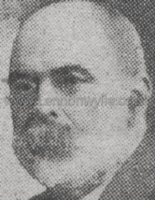
Sir John William Byers
By the
death of Sir John William Byers the medical profession has lost a
distinguished member. Sir John was professor of midwifery in Queen's
University, Belfast, and one of the leading physicians in the North of
Ireland. Death of Mrs.
Mercier-Clements
A large circle of friends will deeply
regret to hear of the death of Mrs. R. G. Mercier-Clements, College
Gardens, Belfast, which took place yesterday, after only a few days'
illness. The funeral of Mrs. Mercier-Clements took place on Saturday
morning, when her remains were removed from 5 College Gardens, for
interment in the City Cemetery. The chief mourners were Councillor Dr.
R. G. Mercier-Clements (husband), Mr. C. W. Mercier (brother), Alderman
S. T. Mercier, J.P. (uncle); and Mr. Ernest Mercier, J.P. (cousin). The
deceased lady was a very active worker in the Unionist cause. She was a
fluent speaker, possessing a thorough knowledge of the Irish question in
all its bearings, and she was able to present her arguments with a force
and lucidity which carried great weight with her audiences. She
addressed scores of meetings in Belfast and other parts of Ulster, and
also did valuable deputation work in England and Scotland, where she
made a strong impression by her transparent honesty and the masterly
manner in which she handled her subject. She was a prominent member of
the Ulster Women's Unionist Association and the Ulster Unionist Council,
and was connected with other political organisations working in the
interests of Unionism. On the temperance question also she took a
definite stand. She was interested in various social and philanthropic
institutions, and was a member of the committee of the Ulster Society
for the Prevention of Cruelty to Animals. The only daughter of the late
Mr. W. T. Mercier, of the firm of Messrs. W. & S. Mercier, Ltd., she was
a niece of Alderman S. T. Mercier, J.P., the esteemed chairman of the
Belfast Technical Instruction Committee. She was married in 1908 to Dr.
R. G. Clements, who was recently elected a member of the Corporation for
the Cromac Division. 23rd
September 1934 Mr. Archibald Marshall
The sudden death at Cambridge of Mr.
Archibald Marshall, a well-known novelist, journalist and contributor to
"Punch," was announced yesterday. Mr. Marshall, who was 68, was educated
at Highgate School and Trinity College, Cambridge. While an
undergraduate he wrote for "Granta," and afterwards joined the staffs in
turn of the "Daily News" and the "Daily Mail," where he worked directly
under Lord Northcliffe. His first novel, "Peter Binney, Undergraduate,"
was published in 1899, and was followed by many other successes.
Mrs. J. H. Smyth
The remains of the late Mrs. Agnes Smith,
wife of Mr. J. H. Smith, overseer Newry G.P.O. (and formerly of
Downpatrick G.P.O.), who passed away at her husband's residence, 7 Vimy
Terrace, after a lengthened illness, were laid to rest in St. Patrick's
Churchyard on Thursday afternoon. The cortege, which was of a most
representative character, testified to the sympathy felt for the
bereaved husband and son. Blinds were drawn all along the route, and all
the available members of the clerical staff of the Post Office, followed
by the postmen in uniform, walked behind the chief mourners. The service
in the church and at the graveside was conducted by the Rev. Canon
Swanzy, M.A. The chief mourners were:- Mr. J. H. Smyth (husband), Master
J. H. Smyth (son), and Messrs. Isaac Carter (brother); George Carter,
Joseph Carter, Rathfriland, and James Lamb, Newry (uncles); J. L.
Pearson, Dungannon; Henry Smyth and Andrew Neill, Belfast; Charles Ewen,
Newry, and Thomas Burton, Benburb (brother-in-law); Masters Richard and
J. Cyril Bell, Belfast (nephews), and Master J. Inwood, Newry (friend).
Floral tributes were placed on the grave from the following:- "In loving
memory of my dear wife Agnes - 'Peace, Perfect Peace.'" from husband and
son; "In loving remembrance of our dear daughter Agnes," from father,
mother, sister and brother, Gorton, Dungannon; from Charles, Lucy, and
family; from Tom, Minnie and family; from Tom, Annie and family, from
Mr. and Mrs. Lamb and family, from the members of St. Mary's Select
Vestry; from the Head Postmaster and staff of the G.P.O., Newry; from
Dick, Jack and Annie; from Annie and boys, Dick and Cyril; from the
residents at Vimy Terrace, from the British Legion, from Mrs. Calter and
family, Sandys Street; from Mrs. Wheatley, Moorvale; from Miss Bryson,
Canal Quay; from Mrs. Grilly, Sugar Island; from Mrs. Inwood and family,
Canal Street; from Violet Moles, from Mrs. Lowans and family.
24th June 1935 Mr. Thomas Shannon
The death took place last night of Mr.
Thomas Shannon, Inver, Larne, who for over 25 years had carried on a
large grocery business in the town. Representative of Inver Ward on the
Larne Urban Council for several years, Mr. Shannon was also a member of
the Larne Chamber of Commerce, and a prominent worker in the local
Methodist Church. He is survived by his widow, three sons, and one
daughter.
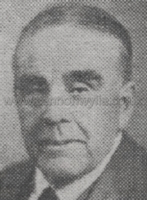
31st May 1935 Mr. Carlton Dawe
Mr.
Carlton Dawe (69), of Kensington, the novelist and playwright, died at
his London home yesterday, after being taken ill on Richmond golf course
on Wednesday. He came to London in 1881 and wrote his first book in
1892. He was the author of several books and plays and a contributor to
many magazines. Mr.
Edmund Gracey, M.B.E.
The death took place on Saturday at his
residence, 84 University Avenue, of Mr. Edmund Gracey, M.B.E., who, for
more than fifty years was connected with the firm of Messrs. Harland &
Wolff, Ltd. Mr. Gracey joined the office staff in his youth, and over
twenty years ago he became chief of the Contracts and Buying Department.
His death severs a link with the Queen's Island of the days of Lord
Pirrie, who had entertained for Mr. Gracey a feeling of warm personal
friendship. He was highly esteemed by the directors of the firm and by
the whole staff in the Belfast offices, and there was great regret when
ill-health caused his retirement about two years ago. Throughout his
business career Mr. Gracey was animated by a single-minded devotion to
duty and the interests of the firm, and for the valuable services he
gave during the war he was made a Member of the Order of the British
Empire. Mr. Gracey was a member of the Church of Ireland, and for over
twenty-five years he was hon. secretary of the select vestry of the
parish on All Saints. He belonged to the Masonic Order and was a P.M. of
Lodge 133, Comber. The funeral will take place to Knockbreda Cemetery
to-day at 2 o'clock. Rev. R. C. H. G. Elliott, M.A., rector of All
Saints' speaking at a memorial service in the church last night, said
that during the twenty-five years in which Mr. Gracey had filled with
distinction the office of hon. secretary of the select vestry, the
church had been enlarged, and what was a small parish had grown to be a
thickly populated district. During those years Mr. Gracey had been the
loyal friend and supporter of the clergy, and he knew how much the late
Rev. R. B. Cooke had valued his wise counsel. When he (Mr. Elliott)
became rector of the parish he found in Mr. Gracey a tower of strength.
Quiet in manner, he was not easily moved, but he always showed himself
possessed of a thoughtful mind and a kindly heart, and his advice was
always the fruit of ripe judgment, and a wide experience of men and
affairs. He has spent his whole life in the service of what was probably
the world's largest shipbuilding firm, and had risen to be the head of a
department with the daily responsibility of the spending of thousands of
pounds. The funeral will take place on Monday afternoon, to Knockbreda
Cemetery. 26th September
1934 Mr. James Ireland
A prominent and highly respected figure in
the business life of Belfast has been removed by the death of Mr. James
Ireland, founder and head of Messrs. James Ireland & Co., woollen
manufacturers, May Street, Belfast. Mr. Ireland, who was in his 74th
year, had been in failing health during the last couple of years, and he
passed away on Wednesday evening at his home, St. Ronans, 80 Malone
Road. A native of Fifeshire, the late Mr. Ireland learned the business
in which he became a specialist at Galashiels, one of the centres of the
Scottish tweed trade. Industrious and hardworking from his earliest
days, he did not spare himself, and integrity, energy and enterprise won
for him the high position which he subsequently achieved in the
manufacturing and mercantile world. When still a young man, but with a
thorough mastery of the woollen trade, he crossed to Ireland and spent
two years with a leading firm in Dublin. In the nineties he came north
to take up the managership of the woollen factory which at that time
Messrs. Ross Bros., Ltd., controlled in Durham Street. In 1898 he
decided to set up business on his own account, and established the firm
which flourishes to-day under the title of James Ireland & Co. At first
Mr. Ireland had his business in Alfred Street, but in a short time
larger premises in May Street were acquired. Under his controlling hand
the business steadily expanded, and for many years it has commanded a
clientele in various parts of the world. In addition to the woollen
manufacturing business the firm has a large turnover in the wholesale
drapery line. The successful progress of the firm may be said to
represent a large chapter in the life story of the deceased gentleman.
Some years ago Mr. Ireland was president of the Belfast Wholesale
Warehousemen's Association. The late Mr. Ireland was an elder of
Fisherwick Presbyterian Church. He took the keenest interest in Church
affairs, and although his business life was so active he threw himself
heartily into congregational and Sunday School work. For many years he
taught a class in the Stranmillis School connected with the Fisherwick
Church. His connection to the church which he joined over 44 years ago,
shortly after coming from Scotland. Some years ago he presented a
magnificent piano to be used in the Musgrave Halls in memory of his
daughter, the late Mrs. William Doig, a talented musician, like her
sister, Mrs. Young, whole solos in past years have often delighted and
touched our hearts. Rev. John Waddell, M.A., Fisherwick Presbyterian
Church, to his widow, son and daughter, and to all the sorrowing friends
we offer our respectful sympathy, and we pray that God may comfort them
and fill the void in their lives with His gracious presence. Mr.
Ireland's funeral took place on Saturday to the City Cemetery.
9th July 1935 - Bishop Grierson
The Dean of Belfast, Very Rev. W. S. Kerr,
B.D. said: "Last Thursday was laid to rest one who gave us all a moving
example of enthusiastic energy in the cause of good and of the household
of faith. Here, where he was vicar and dean for eight years, it is
superfluous to speak of his faithfulness in pastoral work. Especially
his ministry was appreciated in times of illness. By the sick bed he was
indeed a man of God, and imparted a sense of the depth of his own
religious life." Preaching at the morning service in St. Peter's
Church, Belfast, the rector, Rev. Dr. Breene, in the course of a warm
eulogy of the life and work of Bishop Grierson, said: Bishop Grierson
spent fifty-three years in the active work of the ministry, and of those
years 47 were devoted to this great United Diocese. During the last
fifteen years, before his retirement, he was Bishop of Down and Connor
and Dromore; that is to say, from 1919 to 1934.
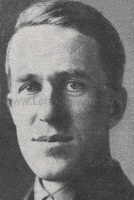
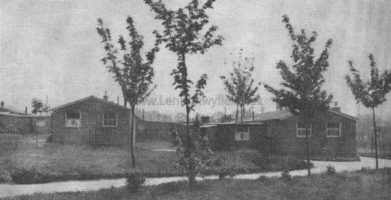
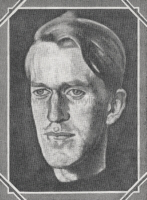
The military hospital at Bovington Camp, where Lawrence of Arabia (46) died
yesterday.
20th May 1935 - Mr. Thomas Edward Shaw (Colonel Lawrence of Arabia)
A very
great, a very gallant, and a very modest man is no more. Colonel T. E.
Lawrence, known in latter years simply as Aircraftman T. E. Shaw, the
legendary hero of unexampled exploits during the Great War, the alleged
"mystery man" of the East, unscathed by war or adventure, lies dead;
killed not by the bullets of an enemy, but by an accidental collision
between his motor-cycle and a little butcher boy. After a great fight
for life which had lasted since last Monday, he died at 8 a.m. yesterday
at Wool Military Hospital, Bovington Camp, Dorset. When he left the
hospital after an all-night vigil, Mr. A. W. Lawrence revealed that it
would have been a tragedy if his brother had recovered, because his mind
was irreparably damaged by the motor-cycle crash which caused his
injury. The funeral will take place at the village church at Moreton,
close to the cottage where Lawrence had been living. Mrs. Lawrence, the
73 year old mother, did not know yesterday that her son was dead. "News
has been sent," said Mr. Arnold Walter Lawrence. "My mother, we have
learned, is with my brother, Dr. M. R. Lawrence, steaming down the
Yangtze river, in China. When they reach Shanghai they will receive a
cable which is awaiting them."
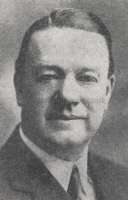
19th January 1934 - Mr. Joseph Devlin, M.P.
Mr.
Joseph Devlin (62), a member of the British and Northern Ireland
Parliaments, died at St. John's Private Hospital, Crumlin Road, in
Belfast early yesterday from a throat infection after a week's serious
illness. His sister, a niece, and her son were at his bedside. The
remains of Mr. Devlin were removed to St. Peter's Pro-Cathedral, where
Requiem Mass will be celebrated at 10 o'clock to-morrow morning. The
funeral will take place afterwards at Milltown Cemetery.
17th July 1935 Dr. George William Russell
. . the Irish poet, who was known to
poetry-lovers the world over as "Æ," died last night in Bournemouth
nursing home. He was aged 68. Dr. Russell had been critically ill for
the past few days. He went to Bournemouth about a fortnight ago to
recuperate after an illness from which he was suffering when he returned
recently from a world tour, but after about a week's stay serious
internal trouble developed and an immediate operation was found
necessary. Dr, Russell's body will be taken to London by the 3.40 train
from Bournemouth on Friday, and then taken to Ireland. The funeral will
take place on Saturday, to Mount Jerome Cemetery, Dublin. Mr. Brian
Russell, son of the poet, and his wife accompanied the remains from
Bournemouth, but Mr. Dermot Russell, the second son of the port who is
travelling from the United States will not arrive until to-morrow. He
was born in Lurgan 67 years ago, but was educated in Dublin.
Wife of Rev. James Grubb
The deepest sympathy, by no means confined
to the members of the Methodist Church in whose affections he holds so
secure a place, will go out to Rev. James Grubb, Belfast, who, under
unexpected circumstances, has been bereaved by the death of his wife.
Mrs. Grubb, we regret to intimate, passed away suddenly at an early hour
this morning in Bangor, whither she had gone at Eastertide on holiday.
An accidental injury to her foot had laid her aside during the past few
days, but it was thought that with the necessary rest she would be out
and about again in due course. A heart attack, however, intervened and
the patient did not rally. Mrs. Grubb was a gracious and estimable lady,
who was beloved everywhere she moved, and the news of her passing will
be received with unfeigned sorrow. Not only to Mr. Grubb, to whom the
blow is so heavy, but to Miss Grubb (formerly a missionary in West
Africa), and the married daughter in England will their sympathy go out.
The only son of Mr. and Mrs. Grubb, Lieutenant Donald Grubb, 5th Royal
Inniskilling Fusiliers, laid down his life at Gallipoli in August, 1915.
Rev. J. Grubb, Funeral at Dundonald
The Methodist Church paid its last tributes to one of its most
highly respected clergymen, Rev. James Grubb, who was called Home on
Thursday last, at his funeral this afternoon. Ill health necessitated
his retirement as a supernumerary in 1923, when he went to live at
Portaferry. Later he removed to the Knock district. Mr. Grubb's only
son, Lieut. Donald Grubb, 5th Royal Inniskilling Fusiliers, was killed
at Gallipoli in 1915, and Mrs. Grubb, who was a Miss Reid, of Liverpool,
died suddenly in 1935. Two daughters survive. They are Mrs. Anderson, of
Hull, and Miss Doris Grubb, who was formerly a missionary in West
Africa. Deep sympathy will go out to the bereaved daughters. Prior to
the removal of the remains from deceased's late residence, Newburn,
Kensington Road, Knock, Belfast, a short service was held. Scripture was
read by Rev. R. H. Gallagher, B.A., Knock Methodist Church, who was a
very close friend of Rev. Mr. Grubb, and who was most assiduous in his
attendance upon him during his illness. Following a prayer offered by
Rev. A. E. Glanville, the remains were reverently borne to Knock
Methodist Church, and, as the procession entered the latter,
Mendelssohn's voluntary, "O Rest in the Lord" was most sympathetically
played by Mr. Cecil W. Nesbitt, organist. The remains were interred at
Dundonald Cemetery.
24th July 1935 - Norah Lady Dunleath
It was announced in Belfast yesterday that
Norah Lady Dunleath, who last week underwent an operation in London for
appendicitis, had died at Boxmoor, Newbury, the Berkshire residence of
her son, the Hon. Harry Mulholland, Speaker of the Northern Ireland
House of Commons. Lady Dunleath was a daughter of the late Captain the
Hon. Somerset Ward, a son of the third Viscount Bangor. She married Lord
Dunleath in 1881, and was the mother of five children, of whom the third
is the present Lord Dunleath. Her eldest son was killed in the war. Lady
Dunleath received the O.B.E. for work in connection with war charities
in County Down. She was a great animal lover and a lover of country life
generally. A memorial service for Norah Lady Dunleath was held yesterday
in Ballywalter Parish Church, It was conducted by the Rev. M. Archdale,
M.A., O.B.E., vicar of the parish, and the lesson was read and prayers
said by the Lord Primate of All-Ireland (Most Rev. Dr. d'Arcy).
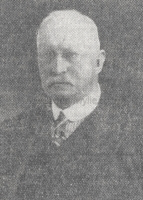
26th July 1935 - Mr. Edwin Darley Hill
We regret
to announce the death of Mr. Edwin Darley Hill, which took place last
night at Ballynascreen House, Greenisland. Mr. Hill was one of the
leading figures in the Irish banking world until his retirement in 1928,
after fifty-four years service with the Northern Banking Company, Ltd.,
during twenty-three of which he held the position of managing director.
The second son of the late Mr. Adam Hill, formerly of H.M. Customs,
Belfast, the deceased gentleman was educated at the Coleraine Academical
and Royal Belfast Academical Institutions, and entered the bank as a
junior clerk in 1874 when only fifteen years of age, the greater part of
his early career being served in the head office. In the early eighties
he occupied the post of cashier in the then newly-opened branch in Royal
Avenue, Belfast, and in 1888 he was appointed confidential clerk to the
directors, and three years later joined the staff of a branch, in
Dublin, as pro-manager. He succeeded to the managership of the Grafton
Street branch in 1896, and in 1904 he returned to the head office on his
appointment as general manager. The following year, on the retirement of
Mr. Thomas Montgomery, he was elected to the vacancy on the Board of
Directors, a position he relinquished in 1928 to the great regret of his
colleagues, with whom he was deservedly popular. The highest
distinctions in the Irish banking world had been conferred on him. He
was a Vice-President, Fellow and special representative of the Council
of the Institute of Bankers in Ireland, and it is noteworthy that in
1913 he was elected President of the Institute, a singular honour, as
this was the only instance up to that time in which the rule of electing
the Governor of the Bank of Ireland to the position had been waived in
the history of the Institute. It was during Mr. Hill's term of
management in Dublin that the present magnificent banking premises in
Grafton Street were projected. The distinction of honorary fellowship
was conferred on Mr. Hill in recognition of his services to the
Institute and to the interests of Irish banking in general. He was also
a member of the Committee of the British Bankers' Association as
representative of the Northern group of Irish banks. My Hill took an
active part in negotiations connected with the readjustment of the note
issues of the Irish banks as embodied in the Irish Free State Currency
Act, 1927, and the United Kingdom (Northern Ireland), Act, 1928, the
duty falling on him as chairman of the Northern group of banks to
preside at many meetings of importance relating to the new legislation.
Mr. Hill's family has had a long and honourable connection with the
Northern Bank. His maternal great grandfather, Mr. Thomas Stott, the
poet of Dromore, was one of the signatories to the original deed of
co-partnership of 1824, while his grandfather, Mr. Adam Hill, who was
one of the first stockbrokers to do business in Belfast in or about
1820, for some forty years from its establishment held the post of
notary to the bank, and on his death was succeeded by Mr. Hill's father.
The family has, therefore, an unbroken connection with the bank since
its formation. Mr. Hill complied the bank's centenary book "1824-1924."
In his younger days Mr. Hill was well known in local musical circles,
and for several years he was a member of the Philharmonic Orchestra. He
was associated with Sir Charles Rafter, a former chief constable of
Birmingham, himself a Belfast man, in the wood-wind section of the
orchestra as a flautist, and, in addition, found scope for his talent as
an exponent of the kettledrums. Campanology also found in him an
interested votary, and on more than one occasion lectures delivered by
him on this fascinating subject have been enjoyed by appreciative
audiences. In sport Mr. Hill's activities centred on rowing, and
advancing years had not diminished his keen interest in it. He had been
for a number of years president of the Belfast Boat Club. Two of Mr.
Hill's sons volunteered for active service during the war, and one made
the supreme sacrifice. Mr. Adam Cyril D. Hill was gazetted 2nd
Lieutenant 4th (Special Reserve) Battalion Royal Irish Rifles (Royal
North Downs), and on proceeding to France was attached to the 7th
Battalion. His daughter, Ina, wife of the Rev. Richard Bird, D.S.O.,
M.A. died. He served with distinction at the battles of
Wytschaete-Messines, 1917, Ypres 1917, and Lange Marck; and was posted
missing with five other officers on 16th August, 1917. His brother, Mr.
A. F. T. D. Hill, passed for the Queen's University Officers' Training
Corps, but was rejected for active service on account of defective
vision. Mr. Hill's youngest son, Mr. Eric H. D. Hill, B.A., a graduate
of Cambridge University, is in the service of the bank, carrying on the
traditions of the family connection into the fourth generation. He is a
well-known tennis player.
Mr. W. J. McKeown
The community in Glenavy and district has
sustained quite a shock in the unexpected removal through death of Mr.
Wm. James McKeown, one of its most respected merchants and residents.
Mr. McKeown was the subject of a seizure in his home shortly after he
had risen to attend business as usual, and the medical aid that was
instantly summoned was unavailing. The last gentleman, who was a native
of Aghalee, had been in business in Glenavy for over 50 years and was
manager of the successful grocery and general business of Messrs. M. L.
and S. Johnston Ltd., was widely known and greatly esteemed. The
Methodist Church in particular has suffered a grievous loss in his
removal, as he was actively interested in its affairs. He was for
several years the circuit steward of Antrim and Glenavy Circuit, of
which the superintendent is Rev. John A. Walton, M.A., ex-President of
the Conference and chairman of the Belfast district. Mr. McKeown, whose
demise is deeply mourned, is survived by his widow and family of three
daughters and one son, to whom sincere sympathy goes out.
Mr. F. J. Moffett
The high esteem in which Mr. Frederic J.
Moffett was held in church, musical and social circles was evidenced at
his funeral on Saturday, from Cromwell Road, Belfast, to Newtownbreda,
at which a large number of former colleagues and other friends were
present. The service at the house and graveside was conducted by the
Rev. Dr. Woodburn, M.A., of Fitzroy Avenue Presbyterian Church, where
Mr. Moffett was organist and choirmaster for over 30 years. The chief
mourners were Mrs. Moffett (widow), Mr. T. H. Moffett, Manchester
(brother), Mr. J. L. Moffett and Mr. Lewers Moffett (cousins), Mr. John
G. McMullen, Mr. Harold McMullen, and Mr Hugh Hill (brother-in-law), Mr.
Thomas G. M. Mullen, Mr. O. Harold McMullen, Mr. D. McMullen, and Mr. H.
McMullen (nephews). Others present included Very Rev. Dr. T. A. Smyth,
Rev. W. A. Watson, clerk of the General Assembly; Rev. Robert Anderson,
M.A.; Rev. William Chestnutt, M.A.; Rev. Professor Paul, M.A., D.D.;
Rev. Professor Haire, M.A., D.D.; Rev. Gordon D. Erskine, B.D.; Rev. W.
J. Harrison, B.A.; Rev. J. K. Cronne (Portaferry), Rev. J. Withers, Mr.
W. T. Ewing, representing the C.P.A.; Mr. George Crawford and Mr. Frank
Carlisle, representing the session and committee of Fitzroy Avenue
Church; Mr. David Irwin, J.P.; Captain C. J. Brennan, Dr. Norman Hay,
Mr. R. Orton, Mr. James Woods, his Honour Judge Thompson, K.C., Recorder
of Belfast; Professor W. W. D. Thompson, Professor McElderry, Mr.
Stanley Drean, Mr. Albert Campbell, and Mr. J. Humbert Craig, R.H.A.
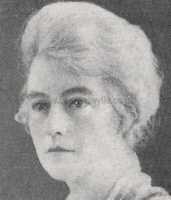
23rd July 1935 - Mrs. Basil de Selincourt
. . who
wrote 20 novels under the pen name of Anne Douglas Sedgwick, died on
Monday at the age of 62 at Hampstead. Mrs. de Selincourt came to Britain
from America when she was nine. Her first novel was written at the age
of 22 and the last - "Philippa" - was published in 1932, her best known
books being "Tante" and "The Little French Girl."
Rev. Mark Guy Pearse
The death took place yesterday of the Rev.
Mark Guy Pearse, one of the most widely known Wesleyan preachers in
England, at his home in West End-lane, Kilburn, London, N.W. He was 87
years old, and had been confined to bed for several months. He was a
quietly humorous man, with ever twinkling eyes and a polished Cornish
wit. His preaching career covered a period of more than 60 years, and
during that time he preached at least 5,000,000 words. Originally it was
intended that he should be a doctor, and he studied at St. Bartholomew's
Hospital, but he became instead a minister, an author, humorist, and
occasional poet. As a writer he charmed Queen Victoria. After reading
his "Daniel Quorm" she ordered that every book from his pen should be
added to her library. Constant pain make it impossible for him to
continue writing when he became ill in June last, but even then his
brain was not idle. He would sit in bed composing and reciting poetry
and telling anecdotes. One of his last sermons was preached in Cornwall
in 1927, and hundreds of his beloved Cornish fisherfolk heard him. His
greatest ministerial work was in connection with the West London
Mission, where he preached at St. James's Hall for 14 years.
Mrs. Richard Lee aka Curtis Yorke
The death is announced of Mrs. Richard Lee,
who wrote many novels under the name of "Curtis Yorke." Her first was
"That Little Girl," published in 1886, and her last, "All About Judy,"
published about three years ago. She was the daughter of Mr. John J.
Long, of Glasgow, and widow of Mr. John W. Richmond Lee, a mining
engineer. She died at her home in St. Quintin Avenue, Kensington.
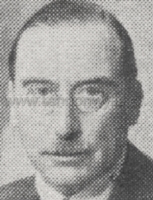
Mr. H. Begbie
Only on
his death yesterday was it definitely revealed that Mr. Harold Begbie,
the famous author, was, in fact, the "Gentleman With a Duster." Soon
after the war a book of political sketches, "The Mirrors of Downing
Street", attracted widespread attention. They were written by "A
Gentleman With a Duster." This book was followed by a series of equally
frank sketches of ecclesiastical figures under the title of "Painted
Windows." That Mr. Begbie was the author of these two famous books was
formally admitted for the first time yesterday by his friend and
publisher, Mr. Charles Boon, of Mills and Boon. Mr. Begbie, who was 58,
died at his home in Ringwood, Hants. He was the son of a clergyman, but
he really belonged to a military family, for both his grandfathers and
one of his uncles were generals, and two of his brothers also entered
the army. He was born in 1871 at Farnham St. Martin, Suffolk, and as a
boy showed promise of literary ability.
Mr. Isaac McElroy
The death took place at his residence,
Mount Oriel, Newtownbreda, on Wednesday, of Mr. Isaac McElroy, who for
many years has carried on a flourishing grocery business in University
Avenue, Belfast. Mr. McElroy had been in his usual good health until
about a week ago, and the news of his death, which was unexpected, will
come as a shock to his many business friends in the city. Before
starting on his own account at University Avenue, he had filled the
position of manager in a number of Belfast concerns, his last
appointments being with Messrs. S. D. Bell & Co., Ann Street, and later
in the grocery department of Messrs. Braithwaite & McCann, Ltd., Ormeau
Road, Belfast. He built up a very fine business, and enjoyed the
confidence of all with whom he came into contact. His ability was
recognised by his fellow businessmen in the city, and for two years,
1920 and 1921, he filled the position of president of the Belfast and
North of Ireland Grocers' Association, Ltd. Mr. McElroy was connected
with the Masonic Order, being a P.M. and treasurer of Symons Masonic
Lodge, and he was also a member of Avonmore Royal Arch Chapter. The deep
sympathy of a wide circle of friends will go out to the members of the
bereaved family. Dr. T.
S. Hogg
A wide circle of friends will learn with
regret of the death of Dr. Thomas Simpson Hogg, who passed away
yesterday after a few weeks' illness, at his residence, Dunmore, Ormeau
Road, Belfast. The deceased gentleman, who was a native of Moneymore,
County Londonderry, practised for over forty years in the Ormeau Road
district and enjoyed the confidence of the residents as a skilled and
successful physician. He gained his B.A. degree with first-class honours
in Queen's University, Belfast, and graduated in medicine in 1888 at
Edinburgh. The late Dr. Hogg won the respect and esteem of all who knew
him by his personal charm, while as a medical adviser he was
distinguished in his profession, and cheered and comforted his patients
by his kindly manner and spirit of optimism. A man of wide reading and
cultured tastes, he kept himself fully informed of the advance of
medical science. On account of the extensive nature of his practice, Dr.
Hogg found it necessary some years ago to take into partnership Dr.
Harold Black, and their clientele was largely increased. Dr. Hogg
belonged to the Fitzroy Avenue Presbyterian Church, and was a valued
member of the congregation, contributing generously to its funds and
charities. He had but little time for recreation, and an occasional game
of golf over the Ormeau links was his principal relaxation from duty. He
leaves his widow, two sons - Dr. Gerald Hogg, of University Square, and
Mr. J. Hogg, B.Sc., of Belfast electricity department, and a daughter,
to whom widespread sympathy will be extended.
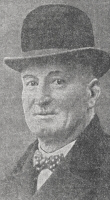
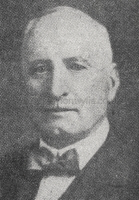
Mr. John McWatters
The death
took place at an early hour this morning of Mr. John McWatters (72),
head of the well known Belfast bakery which trades under the name of J.
McWatters & Co. Ltd. An outstanding tribute was paid to Mr. John
McWatters to-day when all that had been mortal of him was removed from
his late residence Five Beeches, Annadale Avenue, Belfast, and laid to
rest in Knockbreda churchyard. The chief mourners included Messrs.
Charles McWatters and Frederick McWatters (sons), Samuel McWatters
(brother), James McWatters (nephew), C. V. Hill, Norman Rea, and Edgar
Boyd (son-in-law), and W. Baine. Mr. McWatters was born at Derriaghy.
Mr. McWatters, whose wife predeceased him, is survived by his two sons,
Charles and Frederick, and six daughters, three of the latter, who are
married, being Mrs. Norman Rea, Mrs. C. V. Hill, and Mrs. Edgar Boyd.
Mrs. John McWatters
The recent death of Mrs. John McWatters, who was a
member of the Christ Church congregation, was referred to yesterday at
the evening service by the Rev. L. P. Story, B.A. He said that during
the past few days there had been taken away from them one of the old and
valued friends of the congregation, Mrs. McWatters. She was in the true
sense of the word a Christian and a model mother. The funeral was from
her residence, The Beeches, Annadale Park to her last resting place at
Knockbreda yesterday. General sympathy is felt with the deceased lady's
husband, Mr. John McWatters, the head of the famous bakery firm in
Cromac Street, and his family in their sad bereavement. Mrs. McWatters,
whose last illness was very brief, had been known and esteemed for many
years as the possessor of amiable qualities which endeared her not only
to the members of her own respected family but to all who had the
privilege of her acquaintance. The Chief mourners were: Mr. John
McWatters, husband; Messrs. Charles and Frederick McWatters, sons; Mr.
Samuel McWatters, brother-in-law; Mr. James McWatters, nephew; Mr.
Charles V. Hill, Mr. Edgar Boyd, and Mr. Norman K. Rea, sons-in-law.
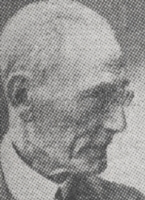
Mr. William J. Locke
After
months of illness Mr. William J. Locke, the celebrated English novelist,
died at his home in Paris on Thursday night, aged 67. His demise was
accelerated by collapse following an operation six weeks ago, the second
of its kind within this year. Since April his recovery has been
hopeless. But, although very weak, he never lost consciousness. He was
able to read a little during his illness and even occasionally to smoke
a cigarette. Miss Sheila Locke, his adopted daughter, was formerly Miss
Baines, the 16 year old daughter of dear friends, who entered the
novelist's family at her own wish. Mr. Locke was born in Barbados, and
was at St. John's College, Cambridge. From 1897 to 1907 he was the
secretary of the Royal Institute of British Architects. He is survived
by his wife, Aimee Maxwell Locke.
Miss Sheila Rosemary Locke Married
In deference to the expressed wish of the
famous novelist, Mr. W. J. Locks, who had adopted her as his daughter,
that the wedding should not be postponed by his death, Miss Sheila Locks
was married yesterday at St. mark's, North Audley Street, W., to Mr. Guy
Currier, of Boston, U.S.A. The late Mr. Locke through his last illness
manifested great interest in all the arrangements for the marriage. The
bride wore a gown of silver tissue, with a long train of the same
material, her tulle veil being fastened with a wreath of orange blossoms
and pearls. Mrs. Locke gave her adopted daughter away, and the
bridesmaids were Miss Betty Hulton and Miss Irene Bersi.
11th November 1933 - Mr. J. A. R. Cairns
Mr. J. A. R. Cairns, the well known London
Metropolitan Police Court magistrate, and a native of Belfast, died at
his home at Walton-on-Thames last night. He had been suffering from
influenza, which developed from a chill caught while watching a football
match on Saturday last. A son of the late Mr. John Cairns, Belfast, he
was educated at the Royal Belfast Academical Institution and Queen's
College, Belfast. "Days of my Youth" In an article published in
1926, Mr. Cairns wrote :- I was fortunate in my ancestry and blessed in
my immediate progenitors. Even now, looking back from the uplands of
half a century's experience of men and things, I still regard my father
as the noblest gentleman I ever knew. As a child and youth, my mother
enshrined all that motherhood should be, so much so that until her
passing at eighty-seven I consulted her in all my difficulties. In my
home there was an appreciation of learning. That influence told early,
and the talks about the achievements of friends and relations in the
world of scholarship sowed seeds that brought forth fruit. In Belfast in
those days there were less social divisions than perhaps exist to-day,
and the town was infinitely less "Anglicised." It has now taken on a
complexion and tone of startling resemblance to Leeds or
Newcastle-on-Tyne. At the Model School was found a "clearing-house" of
youth. It deserved its title, and was a public school in the true sense.
In my time Mr. Mann Harbinson was the headmaster, and amongst the
principal teachers were men who would have been an ornament to Eton. At
fifteen I was fortunate in going to the historic school "The Royal
Academical Institution," where I devoted myself chiefly to classics, and
managed to win the first prize in Latin. At seventeen I matriculated in
the Royal University of Ireland, and attended lectures at Queen's
College, Belfast. I graduated with honours in history, economics, and
jurisprudence. For three years I studied theology, Hebrew, and the
kindred subjects associated with a theological career, and after a
further year in the College of the Presbyterian Church of England, I was
ordained to the historic St. James's Church, Alnwick, founded in 1668.
On Friday, 6th June, 1930, Mr. Cairns was entertained to luncheon by the
Northern Ireland Solicitors' Club in the Carlton Restaurant, Belfast.
Mr. R. Bryan MacKeown presided. On the evening of the same day Mr.
Cairns addressed the General Assembly. Mr. Cairns is survived by two
daughters.
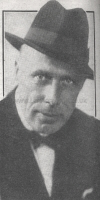
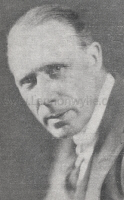
5th October 1933 - Mr. E. Temple Thurston
We regret
to announce that Mr. E. Temple Thurston, the novelist and playwright,
died at his home in London yesterday. He was 53. While playing golf
about three weeks ago he caught a chill, which developed into pneumonia.
What was probably the last of the humorous articles he wrote appeared in
The Daily Mail on February 20. It dealt with death-bed marriages. He
began writing at the age of 16 Mr. temple Thurston dated his working
life from a year earlier, when his father took him from Queen's College,
Cork, and "placed" him in a brewery in that city. It seemed to be an
inspiring environment, for the ambitious boy contrived, while learning
the art of making beer, to produce a "mixed brew" of verses, essays,
articles, and short stories. Nobody was interested, however, and he was
driven to paying for the publication of his verses. These came to the
notice of his father, who told him to take a month off and try to
satisfy him as to his fitness for the literary life. "During that time,"
he has recorded, "I wrote a lot of miscellaneous matter, including 1,700
lines of verse, which I read over to my father. After that he did not
say a single further word about my going back to the brewery." At length
Mr. Temple Thurston came to London, and for a year worked in a yeast
factory in Bermondsey. His next job was that of a traveller for an
electrical supply firm, but after a few months "on the road" he walked
into Fleet Street with the determination of becoming a journalist. He
was engaged by the London Evening News, and very soon distinguished
himself by interviewing Smyth Pigott, the "Abode of Love" leader.
Presently he fell to writing plays, and by the time he was 26 he had
left Fleet Street to concentrate on the production of novels. He was
thrice married.
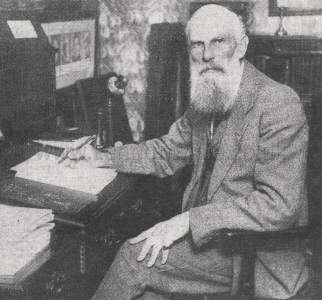
16th September 1935 - Rev. Silas Kitto Hocking
. . the
novelist, who died in London yesterday at the age of 85, at his home,
Heatherlow Avenue Road, Highgate, London, published his first book in
1878 and kept on writing until shortly before his death. A little over
three months ago he contributed to the Daily Sketch series, "Things I
hate." He was born at St. Stephen's, Cornwall. He had a brother Joseph
Hocking, also a writer. Married Miss Esther Lloyd, daughter of a
Liverpool merchant. He had a 2 daughters, one called Mrs. Tideman. He
was the author of over 100 books. He had a son.
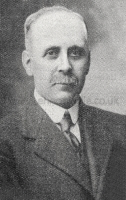
Mr. James B. Thompson
Irish Methodist Church Record,
Edited by Rev. James M. Alley, February 1921
Tribute to the Late Mr. James B. Thompson. . . who was
a great gift of God to the Methodist Church in Ireland. To very many
ministers and laymen, life can never be quite the same again now that he
is gone. His home life was ideal in its character. How he loved those
whom God has given him, and how half his life went when his only son,
Crawford, was killed in the war!
31st October 1935 - Mr. R. J. Robinson
We regret to announce the death, which took
place this morning, of Mr. Robert J. Robinson, "Island View," Cable
Road, Whitehead, a member of the firm of Messrs. Robinson & Gillespie,
wholesale warehousemen, 91 King Street and College Square North,
Belfast. The deceased, who was the only son of the late Mr. David
Robinson, was identified with the town of Whitehead from his boyhood. He
served his apprenticeship to the drapery business with Messrs. Nicholson
& Morrow, Belfast, and for some years he was traveller for that firm.
Later he represented Messrs. James Ireland & Co., May Street. A good
number of years ago Mr. Robinson joined Mr. Gillespie, also of
Whitehead, in partnership. He was greatly esteemed in commercial circles
not only for his sterling integrity, but his kindliness of disposition.
He was well known both in the city and throughout the Province. The late
Mr. Robinson was identified with Whitehead Presbyterian Church from its
inception in 1899, and when the church was taken into connection with
the General Assembly two years later, he was selected for appointment to
the eldership in the congregation. He rendered devoted service to the
Church, particularly it work among the young. He retained the
secretaryship of the Sabbath school for over 36 years, and was unfailing
in his attendance. Deceased was at business as usual during the week,
and his unexpected demise has caused widespread regret among his many
friends. The deceased is survived by his widow, a Belfast lady, to whom
deep sympathy will go out. On Saturday afternoon the funeral took place
from his late residence, Island View, Cable Road, Whitehead, of Mr.
Robert J. Robinson. Prior to the removal of the remains a service was
conducted by Rev. Robert Caldwell, B.A., Waterside Presbyterian Church,
Derry (a former minister of Whitehead Presbyterian Church), and Rev. W.
F. S. Stewart, M.A., Whitehead. At the committal service at Ballycarry
Revs. Robert Caldwell, W. F. S. Stewart, and Thomas McDermott, B.A.,
Albert Street Presbyterian Church, Belfast, officiated. The senior
minister of Whitehead Presbyterian Church, Rev. D. B. Knox, was also
present. The chief mourners were - Messrs. John Barr, Samuel Henderson,
John Dalton, John Elliott, and David Elliott (brothers-in-law) John
Perry (uncle), David Calwell, Robert Calwell, Robin Henderson, Samuel
Henderson, Cecil Henderson, B.A.; Dalton and Desmond Dalton (nephews),
and Robert Johnston (cousin).
1st April 1933 - Miss Dorothy Massingham
All her friends are deeply depressed at the
tragic end of Miss Dorothy Massingham. Death in most tragic
circumstances has come to her very much as it did to Ronald Mackenzie.
Miss Massingham seemed to have a great future as a dramatist. She was
already a well known figure on the stage, playing lead at the Old Vic
and at Shakespeare festivals at Stratford. Knowing all there is to know
about stage technique, and inheriting from her father, the brilliant
journalist, a fine literary touch, she turned her mind to the writing of
plays, and her new piece, "The Lake," at the Westminster Theatre, has
already established itself as one of the hits of the season. She wrote
another full-length play which was given a trial run recently at
Manchester and accorded so enthusiastic a welcome that arrangements have
already been made to put it on in London. Miss Massingham had been in
bad health for a long time, but she seemed to be better recently, and
only a night or two ago went to see her own play. "The Lake," for the
first time.
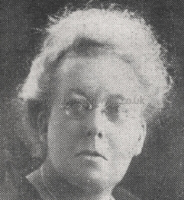
Katherine Tynan
The death
of Miss Katherine Tynan at her London home in St. John's Road,
Wimbledon, last night, after a short illness, removes one of the most
industrious women writers of the day. Born at Clondalkin, Co. Dublin,
and educated at Drogheda Convent, she wrote and published a poem when
only seventeen years of age. Two years later she presented her first
novel to the public. Both met with encouraging acceptance, and for the
succeeding forty years there has been a steady flow of poems and novels
from her pen. Her list of publications, indeed, is formidable yet none
of her work bears any evidence of being scamped or hurried. All her
books show much literary charm, and most of them deal sympathetically
and with clear insight into Irish life and customs, and reveal her
fondness for animals, especially dogs. Miss Tynan was married
thirty-seven years ago to Mr. H. A. Hinkson, who died in 1919. In "Who
Who's" she describes her recreations as "talking to a good listener, the
companionship of dogs, collecting china, and the society of my
children." Her Irish home was at Herbert Lodge, Blackrock, Co. Dublin.
Katharine Tynan was buried yesterday at Kensal Green Cemetery, her grave
lies next to that of Alice Meynell, another noted Irish poet and writer.
Those present at the service included Mr. J. Dulanty, the High
Commissioner of the Irish Free State, Sir Thomas Molony, former Lord
Chief Justice of Ireland, Sir George Young, Mr. Wilfred Meynell, and Mr.
Maurice Healy. Mrs. Mary
St. Leger Harrison (Lucas Malet)
. . the novelist, died early yesterday in
Tenby (Pembrokeshire). The novelist was born in 1852, the younger
daughter of Charles Kingsley, the famous author of "The Water Babies"
and "Westward Ho!" It was little wonder that a girl brought up in this
atmosphere should follow the example of her family, who were said to be
"born with ink in their veins." At 22 she married the Rev. William
Harrison, for some time her father's curate, and later rector of
Clovelly, North Devon. Some of "Lucas Malet's" novels raised a storm of
criticism. The publication in 1901 of "The History of Sir Richard
Calmody" brought her a torrent of letters, many of them coarsely
abusive. Her first novel, "Mrs. Lorimer," was published in 1882, and her
last, "The Dogs of Want" in 1924, but in 42 years of literary activity
she had published only 17 novels. Perhaps her greatest successes were
"Colonel Enderby's Wife" and "The Wages of Sin."
15th July 1933 - Mrs. Clifford Mills
In became known on Thursday that Mrs.
Clifford Mills, the dramatist, whose two principal plays, "Where the
Rainbow Ends" and "The Luck of the Navy," have been played in almost
every part of the British Empire, died in a London nursing home on July
2nd at the age of 70. For very many years this writer, whose romance of
St. George and the Dragon has given untold delight to tens of thousands,
had lived in comparative seclusion in a Bloomsbury flat. And she died as
quietly as she had lived (writes Harold Conway, our Theatre
Correspondent), so quietly that not until last night did her friends
discover that she had been buried in Highgate Cemetery on July 5th. Her
real name was Emilie Clifford, and her daughter, the wife of Major
Shillington, of the Royal Army Ordnance Corps, is now in Hong-Kong.
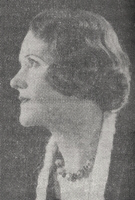
7th October 1933 Kathlyn Hilliard
Miss
Kathlyn Hilliard, who passed away in a nursing home at Worthing on
Saturday, had many friends in Belfast. She was a gifted and versatile
artist, and as charming off as on the stage. Her last appearance at the
Belfast Opera House was in "Bitter Sweet" over a year ago. In 1930
Northern Ireland theatre-goers had the opportunity of seeing her in two
distinct and different studies - first, as the heroine in "La Vie
Parisienne," and later as the leading lady in Schubert's "Lilac Time."
Born in Glasgow, Miss Hilliard was educated just outside Paris, and
afterwards lived with a brother in Algiers. She spoke French fluently,
and this accomplishment added to her personal achievement in "La Vie
Parisienne." Miss Hilliard, who was 37, made her first stage
appearance at Wolverhampton in 1918. In 1925, after a second appearance
as Polly in a revival of "The Beggar's Opera," she joined the British
National Opera Company as principal soprano, and remained with them from
1925 to 1928. During the 1927 B.N.O.C. season she appeared at the Royal
Opera House, Covent Garden. Deceased married Mr. George Baker, the well
known tenor. The funeral will be at Golder's Green Crematorium on
Wednesday next. Miss L.
G. Moberly
Miss Lucy G. Moberly, one of the most
prolific writers of her day, has died at her home, Circus Road Mansions,
St. John's Wood, London, N.W., at the age of 70. She wrote 57 novels and
a great number of short stories for magazines. Her best known works
included "Honour Bright" "The Key of Gold" etc.
26th September 1933 Mrs. A. M. Williamson
. . the famous novelist, died in tragic
circumstances in a Bath hotel on Sunday after doctors had made an
all-night fight to save her life. When no response could be obtained to
knocks on her door, it was broken down on Saturday and she was found
unconscious. Medical aid was immediately summoned and oxygen applied
throughout Saturday night. Mrs. Williamson made a practice of
periodically visiting Bath in order to lay a wreath on the grave of her
husband, who is buried there. Mr. C. N. Williamson died on 3rd October,
1920, and it is believed that she intended to stay until the thirteenth
anniversary of what she had always described as the greatest loss of her
life. Mrs. Williamson was American by birth. She collaborated with her
husband, Mr. C. N. Williamson, but after his death in 1920, she wrote
"The Lure of Monte Carlo," etc. Since the death of her husband Mrs.
Williamson travelled extensively, and became an enthusiastic follower of
the activities of the French Foreign Legion. Recently she defriended
(befriended?) an ex-convict who was granted the King's Pardon for his
defence of a warder in the Dartmoor Prison mutiny, and arranged for his
enlistment in the Foreign Legion.
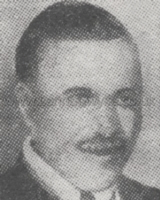
18th December 1933 Mr. Robert W. Chambers
Two
well known writers died during the week-end, Mr. Robert W. Chambers, the
American author of 40 romantic novels, who was 68 and born at Brooklyn
in 1865, and had been ill for some time, and Mr. Louis Joseph Vance
(54), a prolific writer of adventure and mystery stories, who was burned
to death in New York through falling asleep with a lighted cigarette in
his mouth.
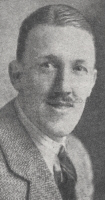
Mr. Crosbie Garstin
. . a novelist, drowned off the
South Devon coast while making for his yacht in a small collapsible
boat. He was 43. Mr.
Clement King Shorter
. . the famous author, died late on Friday
night at Great Missenden, Bucks. Mr. Shorter was for many years editor
of the "Sphere." He was also a distinguished literary critic and an
authority on the Brontes. The deceased, who was born in London, in 1867,
was originally a civil servant in the Exchequer and Audit Department at
Somerset House, but he resigned this work in order to become assistant
editor of the Penny Illustrated Paper. He later became editor of the
"Illustrated London News," and founder of other pictorial publications.
The late Mr. Shorter was twice married, his first wife being Dora,
daughter of the late Dr. George Sigerson, who was an authoress of some
distinction. Deceased was one of the founders of the Omar Khayyam Club
and ex-president of the Johnson Club.
12th May 1933 Mr. J. C. Stobart
After a long illness, the death occurred
yesterday of Mr. J. C. Stobart, who has been described as one of the
Grand Old Men of British Broadcasting. His voice was known to millions
of listeners. He joined the B.B.C. shortly after its formation as
Director of Education, but ultimately gave most of his time to the
religious side of broadcasting. It was he who was responsible for the
now famous Sunday night Epilogue, and he devised and broadcast the
"Grand Good Night," in which each New Year's Eve, for the past eight
years, he sent out friendly greetings to the country and Empire. He was
ill last New Year's Eve and it was in a gentle voice, husky with
weakness, that he wished good cheer in the year to come. B.B.C.
engineers had placed a microphone at his bedside so that he could give
his "Grand Good Night." In it he struck a serious note in which he said,
"The only thing not yet tried is the Christian religion, to love God
first, and then to love your neighbour as yourself."
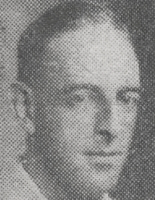
Mr. Donn-Byrne
. . the
Irish writer who was killed by the overturning of his motor-car while
driving near his Irish home, Coolmain Castle, County Cork, had a career
as romantic as any of his own stories. He has died at 39 a rich man,
with an established and increasing reputation, but much of his early
life as a writer was a grim struggle for recognition and the bare means
of subsistence. Mr. Byrne only arrived at Coolmain Castle last Tuesday.
On Monday night at 7 p.m. he went out for a drive in a newly purchased
motor-car along the sea coast near Bandon. Later, when he did not
return, his car was found by his woman secretary. It had been overturned
on the shore near the road, and Mr. Byrne was lying beside it dead.
Brian Oswald Donn-Byrne was born in New York during a visit of his Irish
parents to America, but he was brought to Ireland as an infant and spent
his boyhood years in County Armagh. He began to write early, but meeting
with no encouragement at home returned to America. Still failing to earn
more than a scanty living by his pen, he, nevertheless, fell in love
with a penniless Irish girl, Dorothea Cadogan, who cheerfully shared his
poverty. Suddenly fortune took a complete change. Mrs. Byrne wrote a
play, "Enter Madame." It was a great success. The young couple suddenly
found themselves affluent. Donn-Byrne wrote books. The discerning
critics discovered in him a new type of Irish genius. Success followed
on success. "Stories Without Women" was the first book, and others that
have made a name especially in America are "Foolish Matrons," "Blind
Raftery," and "Hangman's Cross." It is their wistfully poetical
descriptive passages that make their charm, though they have, too, an
element of romantic excitement. Yesterday I heard some interesting
details about the last days of Mr. Brian Donn Byrne, the Irish novelist,
whose autobiography is published in this page. "It is barely a week
since he gave up his house in Surrey to return to his Irish home,
Coolmain Castle, Kilbrittain, County Cork," Mr. J. B. Murray, of Messrs.
Sampson Low, Marston, and Co., told me. He had just completed a long
historical novel which may prove to be his greatest book. It deals with
the period when Castlereagh was a power in English and in European
politics. "Only the other day, too, he revised the proofs of 'Destiny
Bay,' a novel teeming with tales of Irish life, which is to be published
this autumn. "Perhaps the last thing he wrote was the dedication to his
four children:- For Hedda St. John, Jane, Olive, and Brian Oge. Look
unto the rock whence ye are hewn and the hole of the pit whence ye are
digged . . . for the Lord shall comfort Zion; He will comfort all His
waste places; and He will make her wilderness like Eden and her desert
like the garden of the Lord.
Details of the Accident - About seven o'clock in the evening Mr. Byrne
decided to go for a ride in his car, which he had only recently
purchased and brought over from his surrey home a few days ago. He asked
Mrs. Byrne to accompany him, but as she was fatigued after a journey
from Cork he took with him his secretary, Miss Birket. They drove from
Coolmain to Courtmacsherry, about seven miles distant. On the return
journey the car appeared to steer badly and ran into a fence, but was
righted. A little later it almost collided with another car, and Miss
Birket stepped on the brakes in time to prevent an accident. Miss Birket
asked Mr. Byrne to return to Timoleague, but Mr. Byrne refused. Miss Birkett them got out to walk, as they were only two miles from Coolmain.
Mr. Byrne went on in the car. After walking about half a mile along the
shore road Miss Birket saw the car overturned in the sea. She took off
her shoes, waded up to the vehicle, and tried to release Mr. Byrne. Her
cries for assistance brought to the scene a number of men from the
little fishing village near by. They quickly got Mr. Byrne out and
carried him ashore, where he was found to be dead.
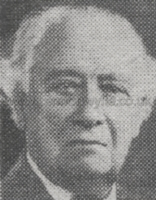
Mr. Walter Raymond
Well known for his novels of the West Country, Mr. Walter Raymond (79)
died in a Southampton nursing home yesterday. Mr. Raymond was famed
throughout the country as the reciter of the works of Barnes, the Dorset
poet, and was a popular figure in war-time camps, which he visited to
entertain soldiers. West Country sketches were his forte. He was son of
a Yeovil glove manufacturer. His last work was the folk play, "Under the
Spreading Chestnut Tree," published in 1928.
Dr. Robert Matthew Bronte
The death took place at his home at Harrow,
yesterday, at the age of 52, of Dr. Robert Matthew Bronte, the eminent
pathologist. He had been in ill-health for some time. Dr. Bronte, who
was a native of Armagh city, served his apprenticeship in the apothecary
shop of Mr. Obadiah Ternan in Enniskillen, and while qualifying for his
medical degree practised as a chemist. On the death of Professor
McWeeney he was called to give evidence for the Crown in all the
important murder trials in Ireland, and frequently appeared in Ulster
Courts. He was a licentiate both of the Royal College of Physicians of
Ireland and of the Royal College of Surgeons of Ireland, and for the
same year was a member of the staff of the latter in Dublin. He served
with the Royal Army Medical Corps during the war, and afterwards set up
in practice in London as a consulting pathologist. In 1918, Dr. Bronte
was appointed assistant to Sir Bernard Spilsbury under the Home Office
in London, and his testimony was of out-standing importance in many
murder mysteries. Dr. Bronte, who was a member of the family to which
the famous Bronte sisters belong, married a daughter of the late Mr.
James Harvey, Enniskillen, and his sister, the late Mrs. Parker, resided
at Holland Park, Belfast, until her death. It is not
generally known that the Rev. Patrick Bronte was a native of County
Down. He belonged to the peasantry, but must have been of uncommon
character, for by weaving and teaching he made his way to Cambridge,
where his studies were pursued with a view to the clerical career which
he adopted. It is noted that the family name was Brunty, but the future
incumbent changed it to Bronte when he entered the University. It was
during his occupancy of the parsonage of Haworth that his girls -
Charlotte, Emily, and Anne, began to weave imaginary tales. Their home
beside the churchyard was bleak and solitary, the wide expanse of
moorland unfriendly, and, having no companions of their own age, they
lived in a world of their own. It was here Charlotte wrote "Jane Eyre,"
Emily "Wuthering Heights," and Ann "Agnes Grey." According to the story
and the play the Rev. Patrick Bronte had little Celtic sympathy. He was
a hard man, and it is amazing how his daughters fostered such
intellectual enthusiasm under his rugged influence.
Mr. Augustine Birrell
With great regret the British public will
to-day learn of the death of Mr. Augustine Birrell, who took the
literary world by storm nearly 50 years ago when he published his once
well-known book "Obiter Dicta." It was a collection of urbane essays
which unkind critics declared had been written for mediocre people to
console them for their mediocrity, but which had very real merits
without any claim to profundity. Thus it came to pass that this gentle,
genial man of letters became Irish Secretary in Mr. Asquith's
Administration, and in the Great War found himself doomed to deal with
murder and civil war in Dublin. He failed, and fled from the asperities
of public life back to that world of books which he so loved. He was not
of the race of those who can ride wild horses or tame tigers, and his
true vocation was that of a witty and kindly literary commentator and
essayist. Mr. Birrell, who has passed away in his 84th year,
visited Belfast on 22nd November, 1907, shortly after he had succeeded
the late Viscount Bryce as Chief Secretary for Ireland.
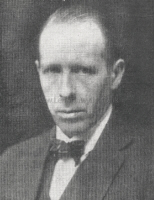
29th September 1931 Sir William Orpen
The death took place in a London
nursing home on Tuesday evening of Sir William Orpen, R.A., the famous
Irish painter. During the war Sir William applied for military service,
and was made an accountant in a military depot. He was commissioned to
paint a portrait of Lord French, then Commander-in-Chief of the British
Army, and was afterwards appointed official war artist, being given the
rank of Major. On the conclusion of hostilities Sir William Orpen was
commissioned to paint the official picture of the Peace Conference and
this picture, "The Signing of the Treaty of Versailles," now hangs in
the Imperial War Museum in London, and is considered to be his
masterpiece. In 1918 he held an exhibition of magnificent war pictures
and in that year received his knighthood. Many of the pictures were
presented to the nation. In 1925 he was the recipient of the honorary
degree of LL.D. at Trinity College, Dublin, and in 1928 he was elected
an R.A. The son of a Dublin solicitor, Sir William Orpen was born on
27th November 1878, and is survived by Lady Orpen, three daughters and
three brothers, one of whom is Mr. R. Caulfield Orpen, a well known
architect residing in Dublin. Sir William was educated at the Dublin
Metropolitan School of Art, and the Slade School. From 1921 he was
President of the International Society of Sculptors, Painters, and
Gravers. He was also President of the National Portrait Society, member
Beaux Arts, Antwerp, member of Academy of Arts and Letters, U.S.A.
member Beaux Arts, Brussels, President of International Society, and
member of New English Art Club. Sir William published two entertaining
books - "An Onlooker in France" and "Stories of Old Oreland and Myself."
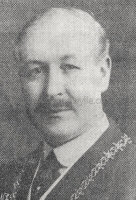
13th June 1937 Sir William Turner
We regret
to announce the death of the Right Hon. Sir William Turner, D.L., which
occurred at his residence, Annadale House, Hampton Park, yesterday. Sir
William underwent an operation in 1935, and for a time was able to
resume his business and public duties, but failing health forced him to
retire in May 1936. To some extent the story of "Dick Whittington" is
applicable to Sir William Turner. From very small beginnings he built up
one of the biggest businesses in Ulster and filled with distinction the
office of Chief Magistrate of Belfast on six occasions. He was a son of
the late Mr. James Turner, of Ballygawley, Co. Tyrone, and was educated
in Belfast.
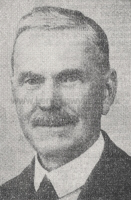
14th June 1937 Senator A. Quigley
It is
with deep regret that we announce the death of Senator Andrew Quigley,
Cabin Hill Gardens, Knock, Belfast, who passed away at a nursing home
this morning following a brief illness. The deceased gentleman was one
of the retiring Unionist members of the Ulster Senate, and on Thursday
last was nominated for re-election. He had been a member since July,
1930. His passing marks the third death in the family within eight
months. In October last his sister, Mrs. R. Keith, died at sea while on
her way from Canada to Belfast, and two months later, in December, his
brother, Mr. John Quigley, J.P., passed away at his residence, 186
Lisburn Road, Belfast. The late Mr. Quigley joined the outdoor staff of
the G.P.O. in 1886. Prior to that he was in the service of Messrs. W. H.
Smith & Son, booksellers and newsagents, and his early training
contributed to his adaptability and the efficient manner which he
exercised in the control of the various departments of the Post Office
entrusted to his care. He rose in time to the position of Assistant
Superintendent, from which post he retired in 1929, having then
completed 43 years' faithful service. As a supervising officer he earned
the respect and goodwill of all sections of the staff, a fact which was
clearly evidenced by the many tributes which were paid to him on the
occasion of his retirement. On that occasion he was presented with a
handsome writing bureau by the postmen's staff. He was the last
surviving member of the staff of the old G.P.O. offices in Queen's
Square. In later years he took an active interest in the Courts of
Referees, appearing on behalf of claimants on many occasions. He was
always ready to give advise and practical help, and was the means of
finding work for many of the unemployed.
14th November 1935 - Rev. Thomas E. Gibson
We regret to announce the death of the Rev. Thomas
E. Gibson, which occurred yesterday at his residence, 17 Lansdowne Road,
Belfast. Mr. Gibson, who had served the Methodist Church in Ireland for
nearly half-a-century, was in good health up to the last, and in fact
had arranged to preach in the new church hall at Glengormley on Sunday.
Although he would have been 81 next month, Mr. Gibson was as active as
many men twenty years his junior. As one of his colleagues stated, "he
was full of vim - a sort of Peter Pan." A native of Westmeath, he
received his theological training at the Methodist College, and entered
the ministry in 1877. During his 44 years active association he
travelled 14 circuits among them being Portadown, Armagh, Dublin, Dublin
Central Mission, Balmoral (Osborne Park), and Clontarf, which was his
last church as minister in charge. He retied in 1921. Mr. Gibson, whose
death is a great loss to the Methodist Church, is survived by two sons
and a daughter, his wife having pre-deceased him some years ago. To the
family in their sudden bereavement deep sympathy will be extended. The
funeral, which will be private, will take place to-morrow.
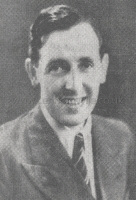
19th April 1935 Mr. James Kennedy, B.A.
"Let us
sing unto their Majesties" a Silver Jubilee march which will be heard
often during the Jubilee celebrations, has been written by an Ulsterman,
Mr. James Kennedy, B.A., who has already been responsible for such
popular numbers as "Play to me, Gipsy," "Isle of Capri," and "Roll
Along, Covered Waggon." Mr. Kennedy is a son of Mr. and Mrs. J. H.
Kennedy, Strand Road, Portstewart. His younger brother wrote, "Ole
Faithful," "Tina" and other songs. Their father is a former Ulster
police officer.
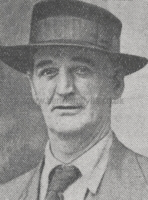
William Conor
A characteristic Ulster
portrait painter whose studies of Belfast mill girls are known
throughout the world. Like most artists, had a hard struggle for
recognition, and still suffers from Ulster's general apathy to the arts.
The Conor touch is body and vigorous, in sharp contrast to the man.
Modest and rather of the self-effacing type, Conor talks softly, smiles
often, and works hard on canvas with oils to reveal that Ulster,
although caring little for art, can produce portrait painters of the
first rank. Had a picture "on the line" at Royal Academy, and has just
finished a portrait of the Primate of All Ireland, which has attracted
considerable attention. Admires and praises everything Ulster, from an
Orange procession at the "Twelfth," to feminine beauty. Thinks Ulster
girls are easily the prettiest in the world.
July 1935 - Mr. Laurence Whistler
The Daily Mail understand that the King's
gold medal for the best volume of verse published in 1934 has been
awarded to Mr. Laurence Whistler, a 21-years-old poet, for his book of
verse "Four Walls." The competitions for the gold and silver medals were
open to all British citizens within the Empire under the age of 35 or to
a poet's first or second volume. "Four Walls" is Mr. Whistler's second
volume. The committee appointed by the King to act as judges consisted
of Mr. John Masefield, the Poet Laureate, chairman, Mr. Laurence Binyon,
Mr. Walter De La Mare, Professor Gilbert Murray, and Mr. I. A. Richards.
The committee has decided not to award the King's silver medal for 1934.
Mr. John Masefield will present the gold medal to Mr. Whistler in the
hall of the Royal Society of Literature in London to-day.
Drama Based on Ulster Linen Trade
For the first time in the history of the
Belfast Little Theatre, a drama of the Ulster Linen trade, by a local
author, is to be produced to-night. The play, "The Tide Turns," by Mr.
Ruddick Millat, has its setting in the linen headquarters areas of
Belfast, where the Little Theatre is situated. The author shows the
effect of a trade slump on a linen merchant's home/ It is probable that
steps will be taken following the production to select an Ulster linen
queen.
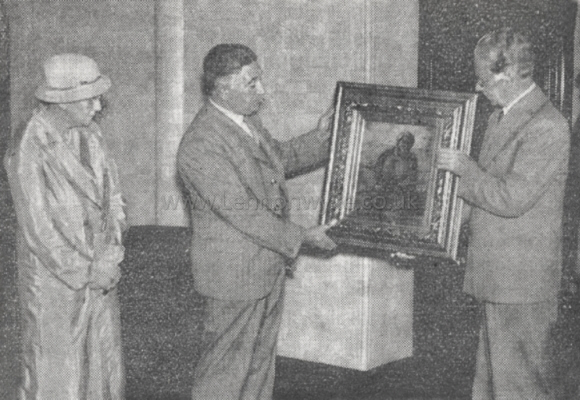
Dr. Alexander Irvine (right) presenting a painting to
Mr. J. Herbert Ireland (general secretary of the Y.M.C.A.) yesterday
30th August 1934 Dr.
Alexander Irvine Comes Home - Month's Visit to Ulster
Alexander Irvine has come home again to see
his birthplace in Pogue's Entry, Antrim, that place of poignant, yet
happy memories, especially when he recalls the sweet philosophy of Anna,
his mother, and the determined struggle for very existence which Jamie,
his father, put forth in the very early days of the now famous author's
life. In Dr. Alexander Irvine's young days he was for a time a stable
boy, and later became a miner. Afterwards he served in the Royal Marines
and later joined the Army, and was with the relieving force which went
to Gordon's rescue at Khartoum. Mr. Irvine has come on a month's visit
to Ulster and during that time he will conduct the services in Newington
Presbyterian Church, Belfast, in the absence of the Moderator.
Yesterday, accompanied by Mrs. S. E. Gillmour and Mr. J. Herbert
Ireland, two of the trustees appointed for the purchase and
reconstruction of the cottage in Pogue's Entry, he visited the scenes of
his childhood and inspected the work of restoring the cottage as nearly
as possible to its original state. In his book, "My Lady of Chimney
Corner," he wrote: "I want to go back some day and cover them (his
father and mother) with a slab of marble, on which their names will be
cut and these words - "Love is enough."
In the churchyard he stood quietly by the side of the
grave; saw where his wish had been fulfilled, and into his mind there
came visions of the past. Dr. Irvine has brought with him a signed
painting by Millet entitled "Maternity," and which is to be hung over
the mantleshelf in the cottage. It came into his possession years ago in
New York, and he feels that this is the place for it. Dr. Irvine is an
authority on Millet and has been lecturing on him for 25 years.
"Maternity" has been valued for as much as £500 and the trustees will
take great care in having it safely and properly hung in the little
cottage. Dr. Irvine proposes to send along many other gifts, and
ultimately all his art collection and his books will go there. He feels
very grateful for what has been done in the way of commemorating not
only his own life, but particularly the lives of his father and mother.
As he said to me yesterday, "I want to light up the gloom; I want to put
beauty into a hard earthen floor." A man of fine stature, Dr. Irvine
speaks in quiet mellow tones, and in ordinary conversation scarcely ever
raises his voice. To meet him is to realise that his one ambition in
life is not wealth, fame, or even rest. "It is to be of service to my
fellow-men," he wrote, "for that is my highest conception of service to
God." To men who have been worsened or imagine they have become so in
the fight of life, he can be of special encouragement, for his own life,
as he has said, has been at times such a tempest and at others such a
calm. Throughout the summer many people from across the Channel and
America who are familiar with the distinguished visitor's life and work
have made a pilgrimage to Antrim to see this shrine being restored for
all time.
12th September 1934 - Dr. Irvine visits
Groomsport
The "Chimney Corner" Teahouse, Groomsport, where Dr. Alexander
Irvine gave a reading of two of his latest stories, "Ordeal by Prayer"
and "The Tinker of Tubercurry," on Tuesday afternoon, is a
place of
interesting associations. It is run by two girls belonging to well known
Northern Ireland families, Miss Peggy Hunter, of Waringstown, and Miss
Marie Hunter, who is a daughter of the late Rev. William Hunter, B.A.,
and Mrs. Hunter of Manchuria. The long low room was filled with dahlias
and gladioli and heather; a cheery fire sparkled in the old fashioned
brick fireplace; Dr. Irvine's quiet voice with its touch of humour, its
recurring pathos, its memories of life in Pogue's Entry, rose above the
conversation of friends, it was an autumn afternoon with autumn in its
loveliest and friendliest mood. The owners are nothing if not
home-lovers. The plain oak tables and chairs were made in Belfast. Their
bright coloured tablecloths are of Ulster linen. The walls are decorated
with woodcuts and etchings by Mr. J. F. Hunter, of the Ministry of
Education, a well known Belfast artist, who is a brother of Miss Marie
Hunter. There are also sketches and signs by Miss Mercy Hunter, A.R.C.A.,
a London art student.
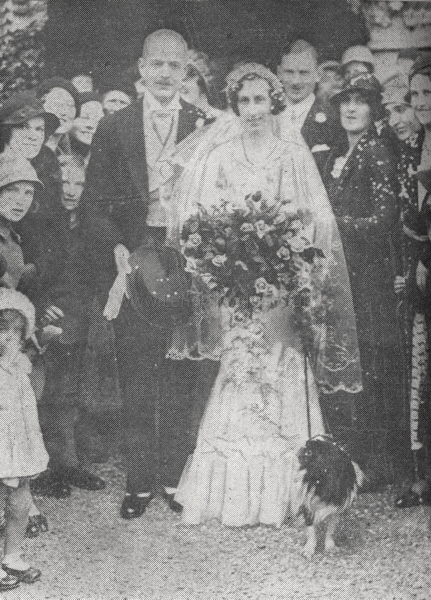
Wedding at Derriaghy Dorman - Allen
Derriaghy
Parish Church was artistically decorated for the wedding of Miss
Gwendolen Allen and Dr. Henry Hobart George Forman, The Mall, Armagh,
which took place yesterday afternoon. The decorative scheme was in
yellow and was carried out in daffodils, ba?berry and golden broom.
The bride is the younger daughter of Mr. Joseph Allen, solicitor,
Lisburn, and the late Mrs. Allen, while the bridegroom is the elder son
of Dr. and Mrs. Henry Hobart Seymour Dorman, Keady, Co. Armagh. The
officiating clergy were the Rev. John Tobias, B.D., Rathmines, Dublin,
assisted by the Rev. C. I. Peacocke, M.A., rector of Derriaghy. Miss
Dickson, organist of the church, presided at the organ. The bride, who
was given away by her father, wore a gown of white mirror satin. The
close-fitting corsage merged into a wide skirt of billowy net, adorned
in ruchings of satin. The shoulder cape was edged with similar ruchings.
The veil of embroidered net was surmounted by a head-dress of orange
blossom, and she carried a bouquet of pink roses. She was attended by
one bridesmaid, Miss Evelyn Kane (Giant's Causeway) and Mr. Jack
Bradbury, Armagh, acted as best man. The bridesmaid's frock of floral
crepe de chine was in blue. Her bouquet was of yellow roses and white
lilac. The reception was held at 35 Castle Street, Lisburn, where the
guests were cordially received by the bride's father and her aunt, Mrs.
S. R. Paul. She was smart wearing a two-piece suit in night blue, with a
big hat to tone. Mrs. Dorman, the bridegroom's mother, wore a gown of
crepe matt, brocaded velvet in sapphire blue, arranged with the new cape
sleeves. The neck line was finished with matching lace. The hat to
correspond was of the new escarpolette. The honeymoon is being spent in
a motor tour of England. The bride's travelling dress was a smart
ensemble suit in dark brown and beige. On the beige frock touches of
dark brown were effective. The coat was collared in lynx, and the hat
was in dark brown. The trousseau was supplied by Renée, Donegall Square,
Belfast. The bride's little dog, Bingo, met the happy couple at the
church door.
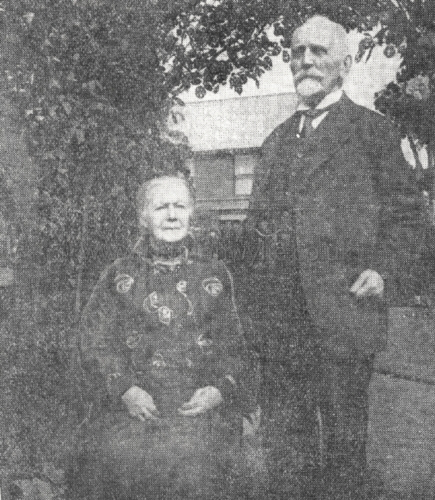
1st July 1935 Sixty Two Years Married
The years
have dealt lightly with Mr. and Mrs. Alexander Deans, of "Haddington,"
Knockbreda Park, Belfast, who were married on 1st July, 1873, a
partnership of sixty-two years. The anniversary of this happy
event, which they are celebrating to-day, also coincides with Mr. Dean's
birthday, as he was born in Soldierstown, near Aghalee, on 1st July
1851, eighty-four years ago. Mrs. Deans, who is four years older than
her husband, is, like him, in good health, with mental faculties
unimpaired, and they have wonderful memories of the social and civic
life of Ulster. They were married in the old Ekenhead Presbyterian
Church, the officiating clergyman being Rev. J. Armstrong. The bride was
Miss Eliza Jane Rice, of Belfast, and formally of Gilford. Mr. Deans
founded, with Mr. James Hodden, the firm of wine merchants and cordial
manufacturers, which later became Messrs. Deans, Logan & Co. Ltd. He was
the principal of this business, his association with the concern
extending over 57 years. Situated in York Lane for seven years, the
business was transferred to Commercial Court, where its activities were
presided over by Mr. Deans for half-a-century. He was well and
favourably known throughout Ireland and Great Britain, travelling
extensively for the firm. He retired from business in April, 1933, and
was followed into private life by the good wishes of a host of friends
and well-wishers. Mr. Deans is a prominent Freemason, and was first
Master of Lodge 530 in 1922, while he has also been Eminent Preceptor of
the Ulidia Preceptory. His membership of the Masonic Order extends as
far back as 1890, and his connection with the Orange Institution began
sixty-three years ago. He is a foundation member of Belvoir Park Golf
Club. Cordial congratulations will be offered to Mr. and Mrs. Deans by a
wide circle of friends on this happy anniversary of their wedding day.
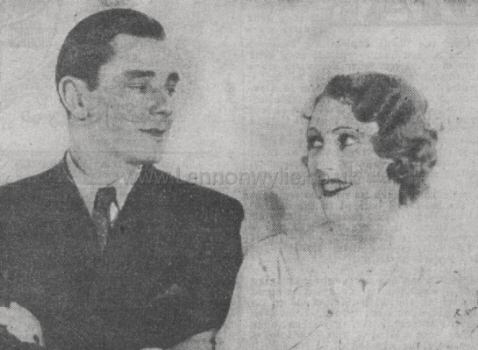
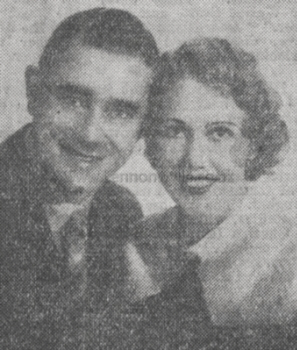
12th May 1934
Ulster Wedding in Australia
24th January 1935
The
marriage took place in Toorak, Australia, to-day, of Mr. John Salters
Moore, who is well-known in Belfast and Bangor, and Miss Shirley Dale,
an English lady well known on both stage and screen. Mr. Moore doe a
period was a teacher of voice production and elocution in Belfast, and
frequently appeared on concert platforms in the city. He then resided in
Bangor, and was a member of First Bangor Presbyterian Church choir.
Going to London, he proved most successful, and while there saw a film
in which he was immensely attracted to Shirley Dale, one of the cast.
Subsequently he was offered a leading role in a company about to visit
Australia and accepted the post. When he entrained for Southampton he
saw his "lady of the screen" in the same compartment, and on being
introduced to her found that she was to play opposite him during the
tour. The friendship which immediately sprang up between them ripened,
and now Miss Dale has become his leading lady for life. The happy couple
are shortly leaving Australia for New Zealand, thence to Honolulu,
California, and across the United States, after which they hope to
return to England. It will be a source of pleasure, though not of
surprise, to his many friends and admirers in the North of Ireland to
learn of the further successes in the world of entertainment of Mr. John
Salters Moore, the young Bangor artist who went out to Australia over
eighteen months ago to play the principal part in the famous musical
comedy "Waltzes From Vienna," which had a most popular run for over a
year in London. Mr. Moore, who filled the part of Shani, the role
portrayed by Robert Halliday in the London production, with Miss Shirley
Dale, the film star, in the character of Rezi opposite him, contemplated
an 18 weeks' tour in the first instance, but has been going from one
success to another, and has had to defer time and again an intended home
trip. Just when he had plans completed on the last occasion for
re-visiting his friends in the old country came an offer so tempting
from the Broadcast Commission for a six months' tour of all the big
stations in Australia that it simply could not be turned down. The
itinerary involves a tour of 15,000 miles. Mr. Moore takes full charge
of the programme, does the announcing, etc., and altogether the
experience gives him great scope for that individuality of his which
never fails to get over. He and his partner present a 45-minute cameo
five times weekly. They have twenty different programmes, ranging from
modern English, Irish, Scottish, and Shakespearean down to musical
comedy. The Irish programmes have been a great hit, as there is such a
large following in Australia. This is somewhat anticipating, however,
"Waltzes From Vienna" had a splendid success in Australia. The company
did a 13-week season in Melbourne, and business was so good they had to
give ten performances weekly for the first four weeks.
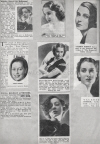
CLICK to enlarge
Valerie Hobson, 17 year old Irish girl

Mr. W. I. Quinn, O.B.E. and Mr. S. A. Bulloch
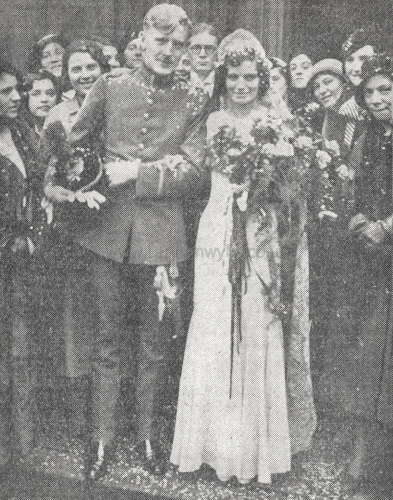
22nd October 1933 Queen's University Students
Dr. Fisher and Miss Crawford
The
wedding was solemnised in St. George's Church, Belfast, on Saturday of
Dr. Robert Ernest Walmsley Fisher and Miss Marie Cerise (Cherry)
Crawford. Then bride and bridegroom met as students at Queens
University, where each took a prominent part in the social life there.
Dr. Fisher edited the undergraduate magazine to which his bride used to
contribute a great deal of poetry. He used to speak a lot at the
Literary and Scientific Society's debates, and his bride constantly
played for the University Dramatic Society. The bridegroom is a son of
the late Dr. R. E. W. Fisher, and of Mrs. Fisher, "Nirvana," Whitehead,
and the bride's parents, Mr. and Mrs. W. Crawford, reside in London. The
Rev. P. E. Major, lately of Doagh, officiated at the wedding. The
bride's frock of parchment georgette was worn over parchment duchess
satin. It was cut on long, slim lines, with a round neck and long tight
sleeves. The skirt terminated in a train. A veil of old Limerick lace
was held in place by a halo of orange blossom. Miss Mona W. Fisher, a
sister of the bridegroom, was the sole bridesmaid. Her dress of bronze
velvet was cut on medieval lines and had a matching coatee. She wore a
bronze and gold velvet cap, and carried a bouquet of bronze
chrysanthemums. Cream roses composed the bride's bouquet. The
bridegroom, who is attached to the Royal Air Force, wore the full dress
uniform of the Force. Mr. J. Boyce, B.A., was best man. Owing to the
unavoidable absence of her father the bride was given away by her
mother, who wore a black ring velvet gown, an ermine stole, and a black
hat. Following the ceremony a reception was held in the Carlton. The
honeymoon is being spent motoring through Ireland. The bride travelled
in a dark green ensemble with dyed squirrel trimming, and a dark green
hat.
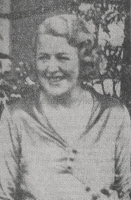
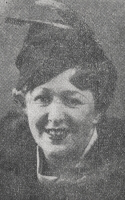
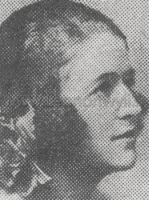
Miss Helen Gilliland in Belfast
"You
know," said Miss Helen Gilliland, the world famous singer, to a
"Telegraph" reporter yesterday afternoon, "Irish scenery is very hard to
beat. It is seven years since I was home last, and I am so glad to be
back, even for a few days. I've been to America and many countries in
Europe, but when I came up the Lough this morning and when I had a drive
I said to my mother, "This is very hard to beat." "Butt it was raining
so hard this morning!" "It was. When I heard the rain on my cabin window
I said to myself, 'That's Belfast! It was raining when I was here last
and the shower isn't over yet.' but when I came out on deck I realised
that nowhere in the world is the colouring just what it is in Ireland,
the green of our hedges and tress is unsurpassed." "It sounds rather as
though your memories of Belfast were a big damp." "Perhaps they are,"
she laughed a little, "but I belong to Bangor and I always used to say
in the old days that the climate of Bangor was far before that of
Belfast." "I'm told it still is, at all events a Bangor man told me half
an hour ago that the weather was quite pleasant to-day." "You see a
great change in Belfast?" "Indeed, no. I felt perfectly at home as I
came up Royal Avenue. There were all the old familiar landmarks. I'm
told there is a great change in the suburbs, but I see none in the city.
It struck me very much after New York, which seems to change every
month." "You liked being in New York, I'm sure." "Oh, yes; I adored it.
I went for six months, you know, and stayed for two and a half years. We
got sunshine there! I had a flat in Long Island during the summer, and
in the winter I had a flat in the city overlooking the river, eighteen
storeys up. I used to lie in bed and watch the boats go up and down."
"You mustn't rush back, you know. What will your next engagement be?" "I
can't give you my plans for the immediate future," said Miss Gilliland,
"because I never reveal engagements until they are quite definite. I am
going to do another show in London after I have had a holiday, but I
shall probably be going back to America later. I'm dying to see
Hollywood, and I'm longing to make a film, I've had a cable giving me a
definite appointment. I can tell you so much." "How long have you been
playing in London since you left New York?" "Oh, four months or so. Sir
Alfred Butt cabled me to come over and play in 'The Song of the Drum,'
and I sailed that very night." In spite of her travels this young Ulster
actress is as frank and simple in manner as when she played in Mrs.
Whale's annual entertainments in the Ulster Hall and elsewhere. She was
quite excited to find that a baby niece had arrived from another world
while she was crossing the Irish Sea, She and the baby's little brother,
Terry Cuthbertson, are the best of friends already, though she was a
stranger to Terry on arrival. Miss Gilliland, who in private life is
Mrs. L. H. Nelles, is staying with her aunt, Mrs. Arthur Tinsley, in
Sans Souci Park, and Mrs. Gilliland, who is naturally delighted to have
her daughter at home again, is there also. "Just think," said Mrs.
Nelles, "it's seven years since I've been at home and I've a great big
little daughter." She now and again betrays her Irish birth by her Irish
expressions, and though she has the "non-accent" of the highly trained
actress and singer her voice has the soft intonation that we all
associate with this land of rain and green. "Judy would have loved
to have come with me," she said, "but I thought it better to leave her
behind, because I can only spare a few days. Colonel Nelles is still in
New York detained on business, but I hope he will be over next month.
Judy has been to New York twice, and loved her experiences there." Miss
Gilliland asked eagerly for news of many old friends, and first of all
for Mrs. Whale, who visited her some years ago at Drury Lane Theatre.
"You don't know how much of my success I attribute to the splendid
foundations of my art that Mrs. Whale laid and developed in me," she
said with enthusiasm. "If it hadn't been for her I would never have
thought of the stage. Her foundation work is simply marvellous. I don't
think I had anything she taught me to unlearn in London, which is saying
a great deal. All her pupils owe her more than they can ever realise,
and I am delighted she is still carrying on her work." Others for whom
se inquired were Miss Eva Kerr, a fellow pupil at Mrs. Whale's, and the
late Mr. W. B. Reynolds, musical critic of the "Belfast Telegraph." "He
took such an interest in us all I am sure he is a great loss to the
city. I still consider that he was a remarkably fine critic and
extraordinarily clever." "Then you are not afraid of criticism?" "On the
contrary, I love it, and I love it best when it is honest and straight,
even if it is hard to bear and may sound cruel, some of us need to be
harshly criticised." Miss Gilliland was very pleased to hear of the
growth of the amateur theatrical movement in Ulster. "Splendid!" she
said. "Give it all the encouragement you possibly can." She is looking
forward to seeing the Abbey Players at the Opera House, even though her
programme for her visit is more than full already. "I shall never forget
my visit to the Opera House some years ago. How my friends did support
me then, the Irish are so much more sincere and loyal than the English.
Bound for America, Belfast Artist Scores Again, Miss
Gilliland Home Call and the Thrill of it.
Miss Helen Gilliland, the gifted artist, who has brought so much lustre
to her native Province, is on another visit to her "ain folk" in Belfast
prior to a second professional tour of the States. When interviewed by a
"Telegraph" representative to-day she sparkled with the rapturous
animation of the exile back among the scenes of her girlhood. "I never
had such a kick out of home as on this occasion," she confessed. And she
looked as if enjoying the very peak of pleasure. "I have been showing my
daughter Judy, who, by the way, has musical and dramatic predilections,
around the haunts of my early meanderings, and we are having a lovely
holiday together. It was my first New Year with my mother since I left
Eglantine Avenue before my debut in London, and you cannot imagine what
a thrill it was to me. Believe me, there is no place like home, and no
friends more dear and faithful than the old friends." Asked if she
noticed much change in Belfast since she left, Miss Gilliland replied,
with a bewitching smile, "Scarcely any. I almost seem to recognise some
of the blinds on some of the windows I passed on my way to school. But I
know that the city has made wonderful headway and I am proud of this,
more especially as Belfast is so renowned for the building of great
liners." Miss Gilliland mentioned as one of the surprise incidents of
her visit a salutation she received from the city's famous flower
seller, Miss Jeannie King. "I was passing through Donegall Place," she
added, "when Miss King rushed over and embraced me, saying how glad she
was to see me back again. This is really typical of the reception I have
had from all my friends, and for which I am so grateful." Asked as
to her future, the former pupil of Mrs. Whale said she was shortly going
to America, where arrangements were made for her re-appearance in
Broadway. She would also re-broadcast when there. She looked forward
with immense interest to renewing her association with the U.S.A., where
for two years, from 1928 to 1930, she had a really remarkable time,
receiving from all whom she met the utmost consideration and
encouragement. On the present visit, in addition to theatrical work in
New York and elsewhere, she would proceed to Holywood for a film in
which she would have a star musical part. This would give her an new
adventure, to which she was looking forward with real enthusiasm. When
it was suggested that she might decide to remain altogether on the other
side of the Atlantic, Miss Gilliland lost no time in removing any such
impression with these words: "I love the people of America. I am very
fond of their artistic ideals. I have no memory other than one of
cherished pleasure for their exceptional hospitality, but the British
Isles have an appeal which cannot be equalled by any other part of the
world. However successful I may be, I will be looking forward to
returning, and I have my heart on appearing once again in my native
city. This chance came my way when I was asked to travel with Lilac Time
and play the part of Lily, which I played in London, but it did not suit
me at the time. However, the future may bring me another opportunity.
Miss Gilliland has one ambition, to act in a straight play. She has sung
with the d'Oyly Carte Co. in all the principal roles. She has appeared
in musical comedy; she has even specialised in variety; now she wants to
try her gifts in a play of the Barrie or Shaw type. The artist sails for
America in the Berengaria. She was looking forward to a holiday on the
initial trip of the Queen Mary, but her engagement in the States came at
a time which made this impossible. All her many friends will unite in
wishing Miss Gilliland "Bon Voyage and the best of luck."
"Katinka," - "Katinka," a new musical play, will be
produced at Birmingham on Monday, and will come on to London, at the
Shaftesbury Theatre, on August 30. The leading parts will be taken by
Binnie Hale. Helen Gilliland (whom you see here (3rd photo above)),
John Coyne, Peter Gawthorne, and George Bishop. Miss Gilliland, who is
best remembered by her first work in Gilbert and Sullivan's operas, in
which she took the chief soprano parts, has since been seen and heard in
"Round in 50" at the Hippodrome, and "The Cousin from Nowhere" at the
Princes. She was born in Belfast.

18th October 1932 Mr. Howard Ferguson
The many
friends of Mr. Howard Ferguson, son of Mr. and Mrs. Stanley Ferguson, of
Deramore Park South, Belfast, will be glad to learn that he has just
scored another musical success, this time at the Wigmore Hall, London.
Mr. Ferguson was born in Belfast in 1908. In 1922 he attracted the
attention of Harold Samuel by the brilliancy of his promise, and upon
his advice he was sent to London to continue his education and take up
serious study of piano and composition. He is the son of Mr. and Mrs.
Stanley Ferguson (Belfast).
21st September 1933 - "Say Not Good-night"
A song, "Say Not Good-Night," has just been
published by a Belfast composer in memory of Mr. Fred Mackey, who lost
his life in a motor accident a year or two ago. Mr. Mackey was an
accomplished tenor singer, and was a member of the Mayfair Glee Singers.
He was well known on the concert platform throughout Ulster, and this
tribute in song to his memory will be greatly appreciated in musical
circles.
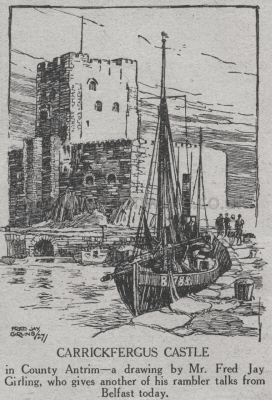
Carrickfergus Castle in County Antrim, a drawing by
Mr. Fred Jay Girling, who gives another of his rambler talks from Belfast
today.
Mr. Fred
Jay Girling, the well known black and white artist and designer, has
secured an important appointment as ship's surveyor to the Board of
Trade at Newcastle-on-Tyne, and leaves Belfast at the week-end to take
up his new duties. His numerous friends in the city, while regretting
his removal, will join in congratulating him upon his success, and
wishing him all prosperity in the future. Mr. Girling is a native of
Leicester, but has been resident in Belfast for 14 years. Having served
his time in the shipyard drawing office, he has for a considerable time
been engaged in the dressing department at Messrs. Harland & Wollf's. As
an artist he has been a regular contributor to the Belfast Art Society
Exhibitions, his water colours and black and white studies always being
worthy of attention. Readers of the "Belfast News-Letter" have been
familiar with the examples of his work, which from time to time have
appeared in our columns, while listeners to the B.B.C. programmes have
heard with pleasure his talks on highways and byways in Antrim and Down.
Dr. E. Norman Hay's "Pæan" Chosen for "Three
Choirs" Festival.
One of the highest honours which a composer
can receive is to have his work selected for performance at the "Three
Choirs" Festival. Failure to pierce the magic circle of the Selection
Committee is in these times the cause of many heart-burnings, and the
list of British composers who have been successful in doing this during
the last two hundred years or so is a comparatively small one. It will,
therefore, be welcome news to the many friends and admirers of the well
known Ulster composer, Dr. E. Norman Hay, to learn that it was
officially announced yesterday that his "Pæan," for mezzo-soprano solo,
chorus and orchestra, is included in the list of works to be performed
at the Worcester Festival in September next. This is a great distinction
for Dr. Hay and for Ulster. It will be remembered that "Pæan" was
composed for the Belfast Philharmonic Society, which gave the work its
first performance in November, 1930. It was again given under the
composer's baton at one of the B.B.C. Ulster Hall concerts in the 1931
summer series. On both occasions the work was received with much
enthusiasm.
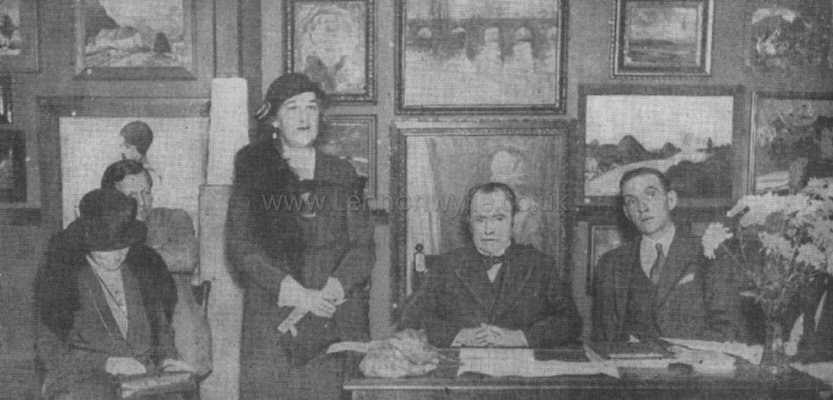
16th October 1935 The Ulster Academy of Arts
Mrs. James Andrews declaring open the exhibition in old museum,
College Square North, Belfast
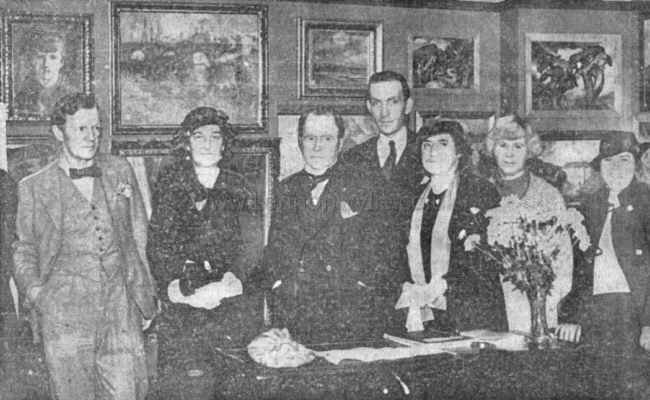
The Ulster Academy of Arts
Platform party at the opening of the exhibition in the Old Museum
Buildings, College Square, Belfast, yesterday. In centre is Sir John
Lavery, R.A. (who presided), and on his right Mrs. James Andrews (who
performed the opening ceremony). The group also includes Mr. J. Ferry
(hon. secretary), Mrs. Carey, J.P., and Mr. Morris Harding, R.H.A.
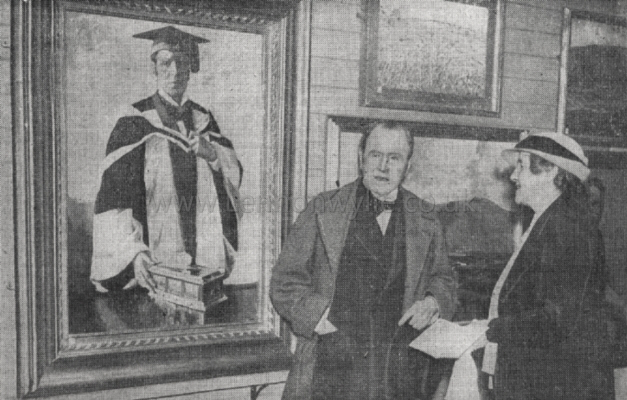
Sir John Lavery, R.A., discussing his
self-portrait with Mrs. J. W. Carey, J.P.
Later in the day Sir John presented this painting to Queen's
University Engagement of
Amateur Actress
The engagement was announced at Belfast
yesterday of Miss Lesley Bell, a pretty Belfast amateur actress, to Mr.
Christopher F. C. Lindsay, elder son of Captain Cecil Lindsay, Lissue
House, Lisburn. Miss Bell won the Heckling Cup presented by the Ulster
Women's Unionist Council in March last, and brought off the double event
for the Whitehouse team, of which she was leader. She is an accomplished
public speaker, and has engaged in theatrical work for charity. Miss
Bell told a Daily Mail reporter yesterday that Mr. Lindsay had not been
present when she won the Heckling Cup. Mr. Lindsay stated that no date
has been fixed for the wedding. Captain Lindsay is ex-High Sheriff of
Belfast. 27th February
1935 Death of Mr. Shan F, Bullock
Mr. Shan F. Bullock, the Irish author, who
died on Wednesday evening in Sutton Hospital, Surrey, after a long
illness, at the ago of 69, was the author of 14 novels of Ulster life
and other volumes. His real name was John William Bullock, and he was a
native of Crom, Co. Fermanagh, the eldest son of the large family of
Thomas Bullock, J.P., of Killynick House, Fermanagh. He was educated at
Farra School, Co. Westmeath, and came to London with an appointment in
the Civil Service. For many years he was a clerk at Somerset House. His
first book was "The Awkward Squads," published in 1893, followed two
years by "By Thrasna River." Critics praised the young unknown author
for his restrained style and his faithful delineation of Irish life. A
succession of novels followed, of which "The Barrys," "The Red
Leaguers," and "The Squireen" were outstanding examples of his work.
Bullock wrote in 1912 the biography of Thomas Andrews, member of the
noted Comber family and nephew of Lord Pirrie, who perished on the
maiden voyage of the Titanic. The death of his wife in 1922 called forth
some poignant poems, prefaced by Mr. Geo. Russell, published under the
title of "Mors et Vita." His reminiscences of his early days in Ireland
appeared in a pleasant volume entitled "After Sixty Years." He was
elected to succeed George Moore in the Irish Academy of Letters. He
served on the Secretariat of the Irish Convention, over which Sir Horace
Plunkett presided, and was made an M.B.E. for his services. Latterly in
his official career he was at the office of the Public Trustee until his
retirement.
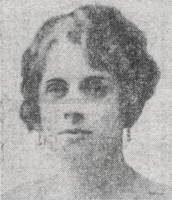
Miss Margaret Cooper
Sudden Death in London
Theatre-goers the kingdom over will be grieved to hear
of the sudden death at her home in Dartmouth Road, Cricklewood, London,
N., on Wednesday night of Miss Margaret Cooper, the famous entertainer
at the piano. Heart failure induced by a clot of blood, following
asthma and a nervous breakdown, was the cause of death. Her health had
been indifferent for several months, but she was up and about until a
fortnight ago, and had hoped to resume her engagements within three
months. Miss Cooper entered the ranks of entertainers with all the
advantages of a serious musical training. In her girlhood she studied
the violin and piano at the Royal Academy of Music. She was taught
singing only because her father thought it would improve her health by
strengthening a delicate chest. Her voice at first, "so tiny that it
wouldn't fill an egg-cup," as she said once, developed so pleasingly
that singing became her serious business in life.
20th August 1936 - Mr. H. Plunket Greene
Mr. Harry Plunket Greene, the famous
singer, died at St. George's Hospital, London, yesterday, at the age of
71, after a short illness following an operation for an internal
complaint. Mrs. Greene and her daughter were present at the bedside. He
was well known in Northern Ireland, where he adjudicated at musical
festivals. A baritone with a remarkable beauty of diction, Mr. Greene
held a unique position for many years as an interpreter of German
Lieder, and did much to restore the prestige of the English folk-song.
He believed that good music and smoking could be enjoyed together. He
instituted smoking chamber concerts, classical music on the platform,
smoking in the auditorium and refreshments close at hand. The first was
held at Princes Galleries, London, in the autumn of 1934. The son of a
barrister, Harry Plunket Greene was born at Old Connaught House, near
Dublin, on 24th June, 1865. He made his debut at a concert in Dublin in
1887, and first appeared in London at the People's Palace in 1888. After
being associated with opera at Covent Garden for a short period, he
abandoned it for the concert platform. From 1890 onwards he sang at many
of the Three Choirs' Festivals. In 1893 he and Leonard Borwick, the
pianist, gave their first joint recital. The funeral will take place at
Hurstbourne Priors, Hants, on Saturday.
Sir Robert Stewart Johnstone
. . late Chief Justice of Grenada and a
native of Belfast, died on 31st December at the age of 81. Born on 23rd
July, 1855, he was the son of Mr. William J. Johnstone, J.P., of Dunesk,
Belfast. He was educated privately at Trinity College, Dublin, where he
graduated in 1882 with honours and medal in history and political
science, and later proceeded LL.B. and M.A. In 1885 he gained a Holt
scholarship at Gray's Inn, and was called to the Irish Bar in 1886 and
to the English Bar in 1889. Having joined the 3rd (Militia) Battalion of
the Manchester Regiment as a lieutenant in 1883, he was promoted to be
captain and honorary major. In 1889 he was appointed to be District
Commissioner in the Colony of Lagos, which at that time was in process
of expansion. In 1894 he was promoted to be circuit magistrate and Judge
of the Court of Common Pleas in the Bahamas, and in 1902 he acted as
Attorney-General of the Colony. In 1893 he married Helena, daughter of
Mr. Otto von der Meden, of Coventry Hall, Streatham, and that had one
son. The funeral will be at Chislehurst Cemetery to-morrow.
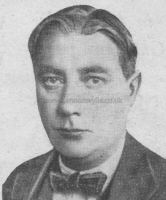
4th November 1936 - Gerald Gould
. . poet,
essayist and critic, died at his home in Hamilton Terrace, London, N.W.
He was 51, and had been in failing health for some time. Mr. Gould once
gave a humorous explanation of the way he obtained his degrees. "At
Oxford," he said, "the examiner asked: 'Where did St. Paul get to at the
end of his journey to Rome?' Fortunately, I knew that one, and that is
how I got my Oxford degree. "I got my London degree by bribing a
professor with 3s. 6d., a pink of beer, and a bowler hat, the first
edition of which had been exhausted."
28th May 1937 - Mr. J. W. Carey
Mr. Joseph W. Carey, the well known Ulster
artist, died suddenly at his residence, Knockdene Park, Belfast,
yesterday. He had been in failing health for some time. A son of the
late Rev. J. W. Carey and a grandson of the late Rev. John Carey, he
received his early art training in the firm of Messrs. Marcus Ward,
Ltd., and was subsequently in a business partnership with Mr. Richard
Thompson. Mr. Carey had the reputation of being one of the finest
artists in Northern Ireland. He executed many commissions and his
beautiful paintings were well known to a wide public. He was one of the
original members of the Belfast Art Society, and was an Academician of
the Ulster Academy of Arts. During the Great War Mr. Carey gave most of
his time to Red Cross work and was a Commandant of the British Red Cross
V.A.D. No. 9. He had a wide circle of friends and was a man of kindly
and genial disposition. His wife is a magistrate of the city of Belfast
and is a leader in social work of all kinds. The deepest sympathy will
be extended to her in her great loss.
3rd May 1937 - Mr. Thomas Tate, Belfast
The death of Mr. Thomas Tate, Caledonia
House, Rugby Road, Belfast, has removed one of our oldest citizens. Born
in 1844, he spent his early years in the employment of Messrs. Wm.
Barbour & Sons, Hilden, later travelling for them on the Continent and
in the United States. In 1887 he commenced business on his own account,
and was later joined by his son, Mr. Hunter Tate, under whom the
business is still carried on. One of the oldest members of University
Road Methodist Church. Mr. Tate held many of the offices in connection
with the congregation, and was a regular attendant at the services until
laid aside through illness about a year ago.
Death of Mr. Samuel Cuffey Watson
The death took place to-day of Mr. Samuel
Cuffey Watson at his residence, 14 Ravenhill Park, Belfast. Mr. Watson,
who was a director of Messrs. Millar, Boyd, & Reid, Ltd., wholesale
warehousemen, Callender Street, Belfast, had been in indifferent health
for some time, and about a week ago had a serious relapse. A quiet,
reserved man of high integrity and kindly disposition, he was greatly
esteemed by a wide circle of friends in business and private life. For a
long period he was an elder of Rosemary Street Presbyterian Church. He
is survived by his wife, one daughter, and two sons, both of whom are
well known in sporting circles. Mr. Tom Watson has long been connected
actively with Cooke Rugby Club and Mr. Stanley M. Watson, the Instonian
Rugby footballer and cricketer, has captained the Ulster Province
juniors at cricket. The funeral will be private and took place from his
late residence to Knockbreda Cemetery.
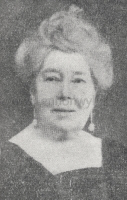
Mrs. Whale
Well Known Ulster Teacher
We very much regret to announce the death of Mrs.
Whale, the well known teacher of elocution, voice production, and music,
which took place this morning at her residence, 71 Fitzroy Avenue,
Belfast, after a short illness. A few years ago Mrs. Whale had been
seriously indisposed, but recovered from this. She had a relapse,
however, a little over a week ago, and the end came as stated this
morning. Mrs. Whale, who was a native of Bath, came to reside in Belfast
with her husband, who was for a considerable period a member of St.
George's Church Choir, and like his wife, whom he predeceased, was well
known in musical circles. For over 30 years Mrs. Whale occupied a
commanding position inn her profession in the city, and trained a number
of very distinguished men and women. Amongst these were Miss Helen
Gilliland, the well known operatic artist; Madame Dorothy Silk, Miss
Winifred Brady, and Mr. Nicholas Breene, all of whom distinguished
themselves in concert or opera. A very large number of students passed
through her hands, and upon these she left the mark of her own
personality and culture. Year after year she produced a seasonal
entertainment at the Christmas period, first in the Exhibition Hall and
in later years in the Ulster Hall. These were always looked forward to
with great interest and commanded large audiences. She frequently gave
performances for the benefit of various charities. Of her two sons,
William is married and resides in Canada, and the other, also married,
is resident in Belfast and employed in Government service. With them
there will be very great sympathy in the loss which they and the whole
public have sustained by the death of this brilliant woman, to whom the
community owed so much throughout her long and useful life. The funeral
of Mrs. Ellen L. Whale took place this afternoon from her late
residence, 71 Fitzroy Avenue, Belfast, to Dundonald Cemetery.
18th September 1936 Mr. John Browne
The death of Mr. John Browne, Adelaide
Park, Belfast, removes a well known figure from the business life of the
community. He was a partner in the firm of Messrs. Hanna & Browne,
Arthur Street, which he joined over 40 years ago, having served his
apprenticeship at Ballymena. Mr. Browne did not take an active part in
public affairs, but was interested in the Masonic Order and was a Past
Master of Craft Lodge Corinthian No. 34 and Past King of Royal Arch
Chapter No.36. His wife predeceased him six years ago, and he is
survived by his daughter Margaret and his son, Dr. Ian Browne, of
Bangor. The funeral takes place to-day to Broughshane.
21st November 1936 - Death of Mr. J. Hanna
Mr. James Hanna, "Landour," Hampton Park,
Belfast, passed away on Saturday afternoon, after a short illness. Mr.
Hanna was one of four sons of Mr. James Hanna, Artnagross, Finvoy, Co.
Antrim. One was Mr. John Hanna, sen., of Ballymoney; another the late
Mr. William Hanna, who was one of the founders of Messrs. Hanna &
Browne, house furnishers, Belfast; while the third still resides at the
old home. After an apprenticeship in the drapery business in Ballymoney,
Mr. Hanna came to Belfast, and eventually became an employee of Messrs.
Young & Anderson, Donegall Street, and as an outcome of meticulous
attention to business he rose to the position of partner and director of
this firm. By his courtesy and kindliness he gained many friends in the
commercial world, while his generous consideration of all members of
thee staff linked them to him in a bond of devotion and gratitude. His
nephew Mr. Alfred Hanna, is secretary of the firm. As a whole hearted
Presbyterian, he took a deep interest in the work of the Church at home
and abroad, and was at the time of his death a member of the Kirk
Session of Newtownbreda congregation. Mr. Hanna leaves a widow.
30th May 1935 - Dr. Percy Dearmer
Dr. Percy Dearmer, the noted divine, died
suddenly in London on Friday night. Only a few hours before he was
apparently in the best of health, and his eldest son, Mr. Geoffrey
Dearmer, had just left London for a Whitsuntide holiday in the New
Forest. Accompanying Mr. Dearmer was his wife, formerly Mrs. Margaret
Vansittart, daughter of the late Sir Henry Procter and Lady Procter,
whom he married two months ago. Dr. Dearmer, Canon of Westminster since
1931, was 69, and had been a leading personality in the Church of
England for many years. A learned theologian as well as an authority on
art, music, and languages, he had written more than fifty books on such
diverse subjects as carols and hymns, the lives of the saints, Gothic
architecture, and Russian literature. Always an outspoken preacher, he
did not hesitate to repeat from the pulpit in Westminster Abbey last
year Kitchener's phrase "a damned lie" in reference to the suggestion
that General Gordon of Khartoum was a brandy drinker. That the Bible was
the worst printed book in the world was one of Dearmer's sayings.
Another was that if a person were ill in pain without hope of recovery
it would be better to end that person's life peacefully and painlessly.
A few years ago he preached a sermon in Westminster Abbey advocating
birth control, and in 1931 he criticised base films as a peril to youth.
Public houses should be open and pleasant places where refreshments of
all kinds could be obtained he aid in another Abbey sermon. "The public
house cannot be abolished, but it can be reformed," he explained. He
attacked sweepstakes as a method of raising money for hospitals. With
Dr. Maude Royden he started services which attracted large congregations
at the Guildhouse, Eccleston Square, from 1920 to 1924. He was a
recognised authority on modern social questions. His Church career was
centred in London where he was born. In 1915 he went to Serbia as
chaplain to the British Red Cross, being decorated with the Serbian Red
Cross. Afterwards he took part in Y.M.C.A. work in France and India, and
visited Japan and the United States towards the end of the war. In 1919
he became lecturer in art and Professor of Ecclesiastical Art at King's
College, London, and occupied these posts at his death. Dr. Dearmer's
first wife, formerly Miss Mabel White, died in Serbia in 1915. He
married in 1916 Miss Nancy Knowles, of Bolton.
1st May 1937 - Mr. Herbert Hughes
The death of Mr. Herbert Hughes (58), which
took place at Brighton on Saturday, will be a great loss to music. The
deceased gentleman, a native of Belfast, had widespread reputation as a
critic and composer, and his Irish folk-songs were favourites the world
over. He was one of the founders of the Irish Folk Song Society in 1904,
and the Editor of its early journals. Son of Mr. F. P. Hughes, the
senior partner in Messrs. Hughes, Dickson & Co. Ltd., the well known
flour millers of Belfast, Mr. Herbert Hughes inherited his love of music
from his parents, who were both vocalists of distinction and often heard
on the concert platforms of the city. His father will be remembered as a
leading tenor in the choir of St. James's Parish Church during the
period when Mr. F. C. Smythe, Mus.Bac., was the organist. So marked were
the late Mr. Hughes' musical gifts that at the early ago of 14 he was
organist of St. Peter's Church, Antrim Road. The late Mr. Herbert Hughes
collected the material for his folk songs in the thatched cottages of
the country, and they are typical of the land and its people. One of the
composer's greatest admirers is Mr. John McCormack, who sang his songs
and made them known in the two hemispheres. Mr. Hughes did not confine
his musical activities to folk songs, as his name is associated with
many well known parodies of nursery rhymes. He contributed articles to
the "New Age," was music critic for the "Daily Telegraph," in 1931-32
was music editor of the "Saturday Review." Twice married, Mr. Hughes is
survived by his second wife, who was Miss Suzanne McKernan, one of the
Irish Players. There is one son, Mr. Spike Hughes, by the first
marriages, and two daughters by the second. The family had taken a house
at Brighton for the season. The deceased had been ill only eight days
when he succumbed to an attack of pneumonia. The late Mr. Hughes
enlisted in the Artists' Rifles early in the war and was O.C. at one of
the Channel Islands (Herm) which was later occupied residentially by
Compton Mackenzie. Afterwards he joined the intelligence staff of the
Egyptian Expeditionary Force under Allenby, and was promoted to cable
censor at Suakin on the Red Sea, and then became Chief Military Censor
in the Soudan. With the bereaved family and with his brother, Mr. Fred
Hughes, Belfast, also a singer of note, there will be deep sympathy.
A correspondent writes:- Only those, I think, who remember Herbert
Hughes living in Belfast as a young man in the early twenties will be
able to recall that before he began his career as a collector and
arranger of traditional airs he was particularly interested in
archæology. At the age of nineteen or twenty he was remarkably well
versed in the antiquities of Ulster. Although he contributed many
articles at that time to journals interested in the subject, the only
publication of this kind from his pen which achieved permanent form was
a booklet called "The Monumental Remains of the Old Abbey Church of
Bangor in the County Down," which he compiled with the help of Francis
Joseph Biggar and published in 1901. It is an interesting and more
informative piece of work, with illustrations by J. W. Carey, R.
Thomson, and other Ulster artists. It contains also a few remarkable
prints described as "rubbings," which seem to have been taken by direct
impression from ancient crosses and tombstones at the Bangor Abbey. One
of the antiquities treated in this manner was the Bangor Cross, which is
now preserved in the chapel at Clandeboye.
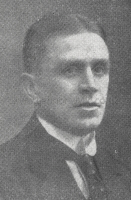
22nd May 1937 Mr. James McCann
This
afternoon the remains of the late Mr. James McCann, who died suddenly at
his residence, 2 Franklin Street, Belfast, on Saturday were laid to rest
in Milltown Cemetery. The funeral was largely attended, the chief
mourners being the deceased's three sisters, Mrs. Richards, Mrs.
Mulholland and Miss Kate McCann. In the cortege were the directors of
Messrs. Warden, Ltd., of which the deceased was resident manager, Mr.
Edward Buckley (chairman), Mr. Rogers and Mr. W. Buckley. The staff of
the Opera House was represented by - Miss Bolton, of the secretary's
office, Mr. Dudley Haire, conductor of the orchestra; Mr. T. Haughey,
publicity manager; and Messrs. L. Bleakley, J. Carey, C. Hart, F.
Hyland, J. C. Donaldson and George Norris. Mr. Cecil King, manager of
the Royal Cinema, also attended. The officiating clergyman at the
graveside was Rev. J. Dean, B.A., C.C., St. Malachy's. Mr. B. McLarnon,
Clifton Street, Belfast, had charge of the funeral arrangements. At a
meeting of the directors of Messrs. Warden, Ltd. held on Saturday, a
resolution was passed expressing regret at the death of Mr. McCann, for
many years the respected manager at Belfast Opera House, and sympathy
with his sisters and relatives in their sudden bereavement.
25th March 1937 - Mr. John Drinkwater
Mr. John Drinkwater, the poet and
dramatist, died in his sleep at his home near Maida Vale, London, early
yesterday morning. He was 54, and on Wednesday night he was a guest at a
West End Club, where a party was given by a member of Old Blues to
celebrate Oxford's Boat Race victory. It is understood that death was
due to heart failure as a result of recent overwork. The end came within
a few hours of the completion of his Coronation film, of which he was
both producer and author. By a tragic coincidence, the film records the
last appearance on the screen of Sir Austen Chamberlain, who also died
suddenly last week. Mr. Drinkwater was married to Miss Daisy Kennedy,
the Australian violinist, in 1924. There is one child, a girl born in
1929. Two years ago, seven year old Penny (Penelope) Drinkwater, John
Drinkwater's daughter, told the Daily Sketch something about her father.
It is forgivable, perhaps, to reproduce extracts now: "My Daddy has grey
hair and a very pretty face. He reads, he writes, he acts, he plays
cuddling games, and he has to keep making a lot of money, he says, to
buy frocks for me. He loves doughnuts and boiled eggs. Daddy hates
anything that's good for him. Most of all he hates going for a walk. He
says it doesn't make sense. He says if you have somewhere to go, go: but
don't wander aimlessly about just because there is such a thing called
"Going for a walk." Then Daddy hates wearing hats. I laughed and
laughed one day when Daddy said to Mummy, "Have you seen my hat?" (Daddy
is always trying to find his hat.) And Mummy said, "Yes, I have, and
here is it," and bang she stuck her hand right through the top of it.
You should have seen Daddy's face. "And now you've got to buy
yourself a new one!" said Mummy, very pleased.
8th March 1935 - Rev. G. W. Thompson
A memorial service in connection with the
passing of the Rev. George W. Thompson was held in Lisburn Methodist
Church on Sunday morning, 3rd March. The Revs. E. Whittaker, W. H.
Smyth, M.A., and J. W. Johnston took part.
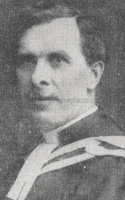
Death of Rev. Dr. Smyth
We regret
to announce the death of the Very Rev. T. A. Smyth, M.A., LL.B., D.D.,
minister of Great Victoria Street Presbyterian Church, Belfast, and a
former Moderator of the General Assembly, which took place yesterday in
a city nursing home. Dr. Smyth had been in indifferent health for some
time, and entered the nursing home at the weekend to undergo an
operation. Dr. Smyth was born near Moneymore on 25th August 1869. He was
brought up in connection with First Moneymore and Carland congregations,
and later in that of Newmills, County Tyrone, in which his father was a
ruling elder. He received his early education in Dungannon Royal School,
and continued his arts course in Magee University College, Derry, and
graduated in Trinity College, Dublin, taking his B.A. in 1912,
subsequently taking his M.A. in 1915 and the LL.B. in 1916. Part of his
theological course was taken in Magee College, Derry, and the remainder
in Assembly's College, Belfast. He was licensed by the Dungannon
Presbytery on 18th June, 1891, and in December of the same year he was
ordained and appointed to his first pastoral charge, that of Clougherney,
County Tyrone, where he laboured with much acceptance for 5½ years. At
the funeral yesterday, the respect in which he was held, not only by his
own congregation but by people of all denominations, was very much in
evidence. After the service in the church the cortege proceeded to the
City Cemetery, the chief mourners being the deceased's two sons, Rev. T.
A. B. Smyth, and Dr. Robert Smyth.
27th March 1937 - Why I Resigned
The affairs of the Ulster Arts Club,
culminating in the surprise resignation of Mr. J. S. N. Sewell, the
president, within three weeks of his taking office, promise to raise
important issues shortly. Mr. Sewell is headmaster of Brackenber House
School, Belfast, and has been a member of the club for some years. One
of the reasons for his resignation is his belief that importance has
been attached to the social side of the club at the expense of its
artistic development. "My efforts to combat this met with so much
opposition that I decided to accept no further responsibility. I felt
that curtailment of social activities might first be directed, among
other things, to the hours in which the bar remained open. I thought
these should be shortened.
April 1937 New Organisation Formed in Belfast
Many Belfast playgoers will regret to learn
that the Little Theatre, after valiant efforts to keep going, has
reluctantly been compelled to close down owing to an extraordinary lack
of public support and appreciation of the excellent work it did in the
interests of dramatic art in the city. It has been felt, however, by
several people that the fruits of the last few years ought not to be
wasted, and so a new organisation called The Playhouse has been formed.
It will extend the policy of the Little Theatre, and in addition to
producing plays which Belfast would otherwise perhaps never have an
opportunity of seeing it is the intention to include the work of all the
Ulster societies, and produce the work of Ulster authors with Ulster
players. Andersonstown to
Wales, Belfast Bride's New Home
The Belfast bride who was married this
afternoon at Osborne Park (Lisburn Road) Methodist Church, is to make
her new home in Wales. She is Miss Violet Larmour, daughter of Mr. and
Mrs. W. F. Larmour, Victoria Lodge, Andersonstown. She has married Mr.
Sydney A. Bayliss, Friar's Road, Newport, Monmouthshire, who is an
official in a bank in Newport, and son of Mr. and Mrs. A. E. Bayliss,
Llanelly, Wales. He was accompanied by Mr. Raymond Glendinning as best
man. Rev. Robert Maxwell and Rev. Robert Rainey officiated, and the
music at the service included the hymn "O Perfect Love." The bride wore
a becoming gown of parchment satin, the skirt terminating in a train.
The corsage was appliqued in lace and had rows of pin tucks in front;
the sleeves were bell shaped and tight fitting from the elbow. A halo of
orange blossom and pearl supported a veil of parchment coloured tulle
embroidered in gold, and she carried a bouquet of pink ophelie roses and
white heather. The bride's train was carried by her little niece, Joy
Boomer. The three bridesmaids were her sister, Miss Ida Larmour; the
bridegroom's sister, Miss Gwen Bayliss, and Miss Kathleen Johnston. They
wore pretty halo headdresses with their frocks of lavender taffeta, made
with gauged bodices and skirts which were finished with billowing net
from the knees, and carried bouquets of carnations. Mr. and Mrs. Larmour
entertained their friends at the Carlton during the afternoon. The
honeymoon will be spent in Cornwall, Mrs. Bayliss's going away costume
being a model suit in navy with navy hat and a silver fox fur, the
bridegroom's gift.
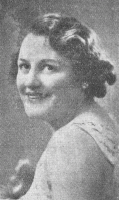
27th March 1937 Miss Geraldine Costigan
The well
known Belfast vocalist, who has been engaged as one of the principals
for the Dublin Operatic Society's week of opera early in April. Miss
Costigan is cast in "Mignon" (Ambrose Thomas) with such leading artists
as Miss May Devitt, Messrs. Ben Williams, Leslie Jones, and John Lynskey.
It is a signal honour to one of Ulster's best known and most popular
singers.
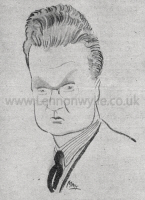
St. John Ervine
In the Days of My Youth
"I think I must have written and written and written before I got anything
printed and paid for."
September 12, 1925
I was
born in Belfast, where, whatever else he may be, a man is definite about
his beliefs. A Belfast man may not know why he is a Protestant or a
Catholic, but he does definitely know that he is either one or the
other. The majority of Englishmen know neither what they are nor why
they are. One of my earliest recollections is of the terror with which I
walked through a Catholic street called Short Strand. It was always a
marvel to me that I got through that street alive and un-assaulted. It
contained two terrors for me, the terror of Catholicism and the terror
of two imbeciles with tiny heads. These imbeciles were each known as
Johnny Wee Head or Johnny Pin Head, and they had the habit of running
into a lime works and seizing lumps of lime which they hurled at
passers-by. Those were the days when imbeciles were allowed to be at
large. Now they are decently hidden away in homes and asylums. I
particularly remember two men, one an imbecile and one a lunatic, who
roamed about the streets of Belfast and were objects of alarmed interest
to me. The lunatic had been a sea captain. Legend said that he had
witnessed the drowning of his wife and become mentally deranged. He used
to walk about the centre of the city, chiefly in the High Street,
carrying a stout stick. At intervals, he would throw his hands above his
head and emit a terrible shriek. He frightened the wits out of me; but
whenever my grandmother, who brought me up, took me to town, I found
myself hoping that we would meet the mad sea captain. The imbecile was
called Johnny-look-up-at-the-moon, because he was always staring at the
sky and prophesying disasters through the moon. In fear and trembling I
once walked beside him along the Sand Quay, and listened to his terrible
prophecies, at the end of which he suddenly turned to me and said: "You
couldn't give me the lend of a ha'penny, could you?" Belfast
seemed to me, when I was very young, to be the most romantic place in
the world. Ships were built in Belfast, and I have always had an
incurable love of ships. I constantly encountered people who made ships
and people who sailed in ships. One of my uncles was a wandering man. He
used to say he had been hungry in nearly every city in the world. My
grand-mother, a woman of great character, always concluded his romantic
stories by assuring him that whatever he had suffered was entirely his
own fault. He could not content himself in his own country and
therefore deserved all he got. She was a very conservative woman with an
absolute conviction that people should stay where God put them, but in
spite of her conservatism, she was the most charitable woman I have ever
known. She condemned few; she endured many. It worried her that my
uncle's tales of travel fascinated me and she took trouble to assure me
that life was no more romantic or thrilling in other countries than it
was in Ireland; and that Belfast was just as enthralling as the Himalaya
Mountains. I did not believe her then. I do now. I remember her wrath at
the frequency with which I fell into the Lagan. Logs used to float on
the downside of the Albert Bridge, and I would climb on to a loose log
and pretend that I was Robinson Crusoe. Then a sudden fright would seize
me as I floated away from the river bank and I would make a wild leap
for the land and get myself soaked. Then there were Orange
demonstrations once a year. In those days the arches were made of dyed
shavings. Now, I believe, they are made of coloured cloth. Young men
used to collect money "for the arch," and a fortnight or so before the
twelfth of July, mysterious sounds would be heard in sheds and entries
where the young men, dyed purple and orange to their elbows, would build
the arches. Only once did I see an arch made, but many times I saw
arches "erected." And one wild night, I saw a fight between "Papishes"
and young Orange-men because the former had tried to "sling" an arch and
pull it to the ground. On the twelfth of July one walked in the
procession. My roaming uncle took me to "the field" the first time I
ever walked in one, and I remember the occasion chiefly because I was
given a sandwich so thickly spread with mustard that I cried and caused
some confusion among the orators. The ambition of my life then was to be
allowed to hold a banner "string." I achieved my ambition once, and was
given sixpence for my help, but I got tired of holding the "string" long
before we reached "the field." About that time my interest in Orangeism
began to wane. For two reasons. My grandmother took me to an Orange
bazaar in the Ulster Hall. I had a three-penny-bit in my pocket and I
remember I had planned with great skill and accuracy just how I should
spend it. When we got into the hall, my grandmother took me straight to
an armchair and made me sit in it. "Now you can say you've sat in Kind
William's chair," she said, and made me give the three-penny-bit to the
man in charge of the chair. That dashed my enthusiasm for the Orange
Order, and I have never recovered it. The other reason is more remote
than that. One night, crossing the two bridges, which lead from Cromac
Square to Albert Bridge Road, I was suddenly seized by rough Catholic
boys who were members of what was called a "reekie clan." They beat my
head with their fists, urging me to curse King William. I took little
interest in King William, who had been dead for some centuries anyhow,
but I was not going to allow any Fenian to order me about, and I refused
to curse his defunct Majesty. So I was mercilessly "cabbed" on the head
by the knuckles of the "reekie clan." After a while they tired of
beating me without a good reason for it, and so they invited me to curse
the Pope. I took as little interest in the Pope as I did in King
William, but since he was their Pope and they wished him to be cursed
and I was sick of being "cabbed," I did as they told me, and I said in a
loud voice: "To hell with the Pope." But were they satisfied?
Not a bit of it. They hammered my head so hard I nearly fainted. Then I
landed out with my fists and feet, and I am pleased to say that I gave
one of those Papists a kick in the stomach which has, I hope, troubled
him ever since. I began then to feel that my interest in ships was
better than their interest in theological discussions. It was not
until after the death of my grandmother, and not until I was seventeen,
that I at last for the chance to go to London, where, with breaks, I
have been ever since. I ought to add that I was always scribbling
stories and acting in "shows" when I was a youngster, but I did not
aspire to authorship then. That aspiration came later, and I think I
must have written and written and written before I got anything printed
and paid for. My first published piece, I think, was a column in a
defunct paper called the Free Lance, which was edited by Clement
Scott. After that came a long interval during which nothing was printed,
though much was written. Then suddenly I found myself appearing in the
Manchester Guardian and the Daily News; and one night,
when my spirits were in my boots, for I was living in lonely lodgings
and was very hard up, a letter came from Mr. Yeats to say that he liked
a play of mine called The Magnanimous Lover, and would I please
come and see him? After that came Mixed Marriage. I thought my
fortune was made. and, on the strength of the royalties I thought were
coming to me, I got married. When I saw the royalties! . . .
All that is the first part of my youth. The second part
of my youth has just begun. I hope it will last for the rest of my life.
St. John Ervine.
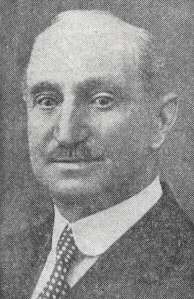
Mr. Sam McWatters
We regret
to record the death of Mr. Samuel McWatters, which took place at his
residence, 59 Balmoral Avenue, Belfast, on Sunday, in his 68th year. A
director of the firm of Messrs. John McWatters, Ltd., The Bakery, Cromac
Street, Belfast, the deceased gentleman was a brother of the founder of
the concern, the late Mr. John McWatters. A member of the Masonic Order,
he was a Past Master of St. Jude's Lodge No. 26, and he was also
connected with Avonmore R.A.C. No. 26, while he was in addition an
Orangeman of long standing, being attached to L.O.L. No. 1251 for many
years. A member of the Church of Ireland, Mr. McWatters was a
parochial nominator and synodsman and member of the select vestry of St.
Jude's Parish, and he was also honorary treasurer of the Parochial Hall
Building Fund, and a member of the District Regional Committee. He also
filled the office of churchwarden on two occasions. He is survived by
his widow, one son and two daughters, to whom widespread sympathy will
be extended in their bereavement. The funeral will take place on Tuesday
to Derriaghy. A service in memory of the late Mr. Samuel McWatters
was held in St. Jude's Church, Belfast, on Sunday morning, at which the
rector (Rev. Jas. Quinn, B.A.) preached, and the Rev. J. H. Gebbie
(curate) conducted the service. The late Mr. McWatters had filled most
of the offices open to a layman in their Church, parochial nominator,
diocesan synodsman, twice rector's churchwarden, member of the Select
Vestry, and hon. treasurer of the Building Fund. Why had he so devoted
himself to the work of St. Jude's" Because he recognised an invitation
to do something for God. To his widow and family they extended their
deepest sympathy. At the conclusion the "Dead March in Saul" was played
by Mr. J. Vine, F.R.C.O. (organist).
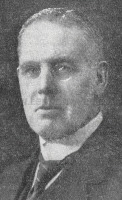
Mr. Robert G. Geale
We regret
to announce the death of Mr. Robert George Geale, City Treasurer of
Belfast until February, 1933, which took place on Saturday at his home,
40 Wellington Park. For many years an outstanding figure in the
municipal life of the city, Mr. Geale had the reputation of being one of
the ablest and most experienced authorities in the United Kingdom on all
branches of local government finance, and his advice was frequently
sought by corporations and their financial advisers in many parts of the
Kingdom. For twenty years prior to being appointed city accountant, in
1909, Mr. Geale was in the service of the Belfast Bank, whose directors
held him in the highest esteem. Entering the bank in 1889, he was
engaged in the head office and in several of the branches, and in 1907
was appointed assistant manager of the Central branch in the City.
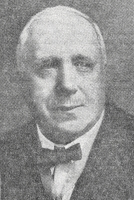
Mr. Samuel G. Crymble
The death at his residence,
College Green, Belfast, yesterday, of Mr. Samuel G. Crymble removes
a well known figure from the life of the community, and particularly
the legal profession, of which he was a member for almost 40 years.
He was a son of the late Mr. Matthew Crymble, founder of the firm of
Messrs. M. Crymble, Ltd., Wellington Place, Belfast, and graduated
at the Royal University of Ireland. He took the degree of LL.B., and
was admitted as a solicitor in 1898. In his profession he earned the
respect and esteem of clients, colleagues and the judiciary. He was
honorary solicitor to the North and West of Ireland Commercial
Travellers' Association, and also the Belfast branch of the United
Kingdom Commercial Travellers' Association. He took a keen interest
in the welfare of young solicitors just on the threshold of their
careers, and his advice was often sought and readily given. Mr.
Crymble was the last president of the old Northern Law Society and
the first president of the Incorporated Law Society of Northern
Ireland, a position which he held for three successive years. When
the Government of Ireland Act of 1920 came into force Mr. Crymble
took an active part in the proceedings which resulted in the
granting of a Royal Charter in 1922 whereby the Incorporated Law
Society of Northern Ireland came into being. Mr. Crymble was a music
lover. He was also keen on sport, and rarely missed attendance at
important association football matches in the city. He married a
daughter of the late Mr. Samuel Agnew, who was well known in the tea
trade. His wife survives him. Their only son, John Gordon Crymble,
was killed in action during the Great War.
7th September 1936 - Mr. James Dann
The news of the death of Mr. James Dann, F.R.C.O.,
R.C.M. (Hon.), a well known Ulster musician, of Hawthornden Road,
Belfast, which occurred on Monday at Bristol, will be received with
deep regret by a wide circle of friends. Mr. Dann was on holiday,
accompanied by his daughter, and on the return journey from a cruise
to the West Indies was stricken with illness which quickly developed
into bronchial pneumonia. All that medical skill and careful nursing
could do was done, but with no avail. Mr. Dann came to Belfast from
England many years ago with a splendid musical reputation, and for a
considerable period officiated at the organ in the Wellington Hall
of the Belfast City Y.M.C.A. Later he was appointed organist and
choirmaster of University Road Methodist Church, where he served
with much ability. Eventually his teaching and other engagements
compelled him to relinquish the position to the deep regret of the
congregation. Latterly he had acted as organist of High Street
Presbyterian Church, Holywood, and there, as in Belfast, his work
was of a very high order. As a teacher he ranked high, and his
gentle disposition gained for him the respect and affection of his
many pupils. By these and other friends he will be sincerely
mourned. Surviving him are his widow and a daughter, Miss May Dann,
who is well known in the musical profession in Belfast.
Sir John Foster Fraser
. . distinguished journalist, lecturer,
and traveller, for 40 years one of the most popular figures in Fleet
Street, died yesterday in London, aged 67. He had been ill for some
time and underwent a serious operation a month ago. One of his most
remarkable travel exploits was a journey around the world on a
cycle, started in 1896 and completed 774 days later, after a ride of
more than 19,000 miles. The son of an Edinburgh parson, the Rev.
John Fraser, Sir John received an early training in provincial
journalism. Parliamentary correspondent and descriptive writer, Sir
John had traveller in almost every out-of-the-way place in the world
in search of material for his pen and for his lecturing tours.
Knighted in 1917, he lectured in the United States for a year on
Great Britain's part in the war, and was thanked by the U.S.A.
Treasury for his help in raising the Liberty Loan of 23,000,000
dollars. On 1906 he spent several months in the famine regions of
Russia. He was the author of many political and travel books. In
1927 he married Miss Constance Mary Lowe. Their home was at Princes
Risborough, (Rosborough?) Buckinghamshire.
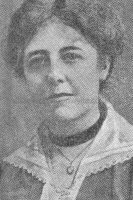
Hon. Lady Kennedy
We regret
to announce that the Hon. Lady Kennedy, wife of Sir Robert Kennedy,
K.C.M.G., C.M.G., M.A., D.L., passed away to-day at her residence,
Cultra Manor, Co. Down. Her ladyship was the third daughter of the fifth
Viscount Bangor and was a sister of the present Viscount, Speaker of the
Ulster Senate. The news will be received on all sides with feelings of
deepest sorrow, and the sympathy of the community will go out
unstintedly to Sir Robert upon the severance of a happy married
partnership which extended back for 53 years. A most impressive memorial
service was held in Glencraig Church in Sunday evening, when the Rev. G.
W. Capsey, M.A., R.D., rector, paid a glowing tribute to the wonderful
service of the late Hon. Lady Kennedy. Prior to the service the funeral,
which was strictly private, had taken place in the Pinetum, the private
cemetery in Cultra Manor grounds, when only relatives and immediate
friends of the family were present. The service opened by the singing of
the hymn "Abide with Me," and the Archdeacon of Down (Ven. C. C.
Manning, M.C., M.A.), read the Lesson.
16th October 1936 - Madame Albanesi
The passing in London to-day of the
novelist, Madame Albanesi, better known as Effie Adelaide Rowland, calls
to mind the tragic death of her only daughter, Meggie, thirteen years
ago, at an early age Meggie Albanesi was cut off from a life that
promised to be one of the most notable on the British stage. Galsworthys
"Skin Game" owed much of its great popularity to her delicate sensitive
acting. Madame Albanesi published her first novel, "Peter a Parasite,"
in 1901. Favourable criticism encouraged her to continue her work at the
rate of practically one book a year up to the time of her daughter's
death. Her husband, Le Chevalier Carlo Albanesi, died in 1926, but in
spite of these griefs she published one of her most successful works,
"Meggie Albanesi," two years later.
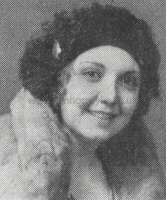
Mme. Conchita Supervia
The news
of the death of Mme. Conchita Supervia will come as a shock to those who
have vivid recollections of her youthful presence on the stage of Covent
Garden in the recent summer seasons of opera. She entered a nursing home
on Sunday and gave birth to a child (stillborn) yesterday, herself dying
shortly afterwards. Conchita Supervia was born in Barcelona, Spain, on
December 6, 1899, but as a child went with her family to Buenos Aires,
where she made her operatic debut at the remarkably early age of 15. The
beauty of her contralto voice, her ease and grace on the stage, combined
with her youth, secured her immediate success, particularly in Carmen,
which was very shortly to be repeated and extended in Europe. She was
not much older when she appeared at La Scala and sang in Italian, and,
what was even more remarkable, in German operas there. By her first
marriage, which took place when she was about 16 years of age, Mme.
Supervia had an only son. In 1931 she married Mr. Ben Rubenstein, of
Rustington, so that latterly she has made her home in Sussex and London,
and has sung in the provinces as well as at Covent Garden.
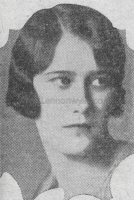
Hon. Diana Skeffington
. . the
21 years old daughter of Viscount Massereene, died yesterday after an
illness of only two weeks from pneumonia and typhoid at her father's
house in Kensington, London, W. Miss Skeffington was a leading spirit
among the young organisers of charity entertainments, and was noted for
her versatility. A friend of Miss Skeffington told a Daily Mail reporter
yesterday:- "Her death will be a sad blow to her many friends. She was a
charming and vivacious personality and was a keen rider to hounds. She
was fond of the country, the open-air life and, like her mother, was
keenly interested in literature and in Gaelic folk-lore." Viscount
Massereene and Ferrard was Parliamentary Secretary to the Prime Minister
of Northern Ireland from 1921 to 1929, and was a member of the Senate of
Northern Ireland for some years. Eighteen years ago, when the family
seat, Antrim Castle, Ireland, was burned to the ground, the whole family
had a narrow escape from death. One of the servants died from burns, and
a guest had to jump from a window to save his life.
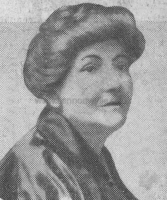
Mrs. Marjory Kennedy Fraser
We regret
to announce the death of Mrs. Marjory Kennedy Fraser, which took place
in Edinburgh on Saturday at the age of 73. Throughout her long life she
was devoted to music, and the mantle of her father, David Kennedy, one
of the finest Scots songsters of the latter half of the 19th century,
fell worthily on her shoulders. Her first appearance in public was at
the age of 12 as her father's accompanist. On the death of her husband,
Mr. A. Y. Fraser, headmaster of Allan Glens School, Glasgow, Mrs.
Kennedy Fraser established herself as a teacher of music in Edinburgh in
1890, but it was not until 1905 that she was able to devote herself to
her great ambition of starting her collection of Hebridean songs. A
memorial service will be held in St. Giles Cathedral, Edinburgh,
to-morrow.
the end |









































































